Tools Required
| • | EN-48464 Lower Timing Gear Tensioner Holding Tool |
| • | J 44221 Camshaft Holding Tool |
| • | J 45059 Angle Meter |
Removal Procedure
- Remove the air cleaner element. Refer to Air Cleaner Element Replacement .
- Remove the air cleaner outlet resonator. Refer to Air Cleaner Outlet Resonator Replacement .
- Remove the powertrain control module (PCM) and engine wire harness bracket and related hoses and connections. Refer to Powertrain Control Module Replacement .
- Remove the generator. Refer to Generator Replacement .
- Remove the intake manifold. Refer to Intake Manifold Replacement .
- Remove the exhaust manifold. Do not remove the exhaust pipe from the manifold. Only have the manifold pushed off to the side of the engine. Refer to Exhaust Manifold Replacement .
- Position the A/C line out of the way towards the front of the vehicle.
- Disconnect the following cross-vehicle engine wiring harness connectors:
- Set aside the cross-vehicle engine wiring harness on the left side of the vehicle.
- Remove the camshaft cover. Refer to Camshaft Cover Replacement .
- Partially drain the cooling system.
- Before performing one of the top dead center (TDC) procedures, break loose both the exhaust and intake camshaft sprocket bolts. Use a 25 mm (1 in) open end wrench on the camshaft hexes to hold the camshaft from turning. DO NOT remove the bolts.
- Perform one of the following methods for the service timing procedure.
- First Method--Rotate the engine clockwise by hand to TDC on the compression stroke by using a piston TDC indicator tool and/or dial indicator in the number 1 cylinder.
- First Method (continued)--The TDC indicator tool graduation marks on the shaft should note top of the piston stroke.
- First Method (continued)--When the piston is at TDC, the flats at the rear of the camshafts will be facing up and level when using a straight edge across the camshaft flats.
- Second Method--Rotate the crankshaft in the engine rotational direction clockwise until the number 1 piston is at TDC on the compression stroke. The word Delphi on the exhaust camshaft position actuator will be parallel with the cylinder head to cam cover mating surface. When the piston is at TDC, the flats at the rear of the camshafts will be facing up and level when using a straight edge across the camshaft flats. A 0.005 inch feeler gage should not slide under the straight edge (1).
- Use a white paint pen or equivalent to place a reference mark on the harmonic balancer to the front cover for alignment purposes.
- Lower the vehicle.
- Install J 44221 to the back of the camshafts.
- Remove the upper timing chain guide to the cylinder head.
- Clean the timing chain and gears with brake cleaner or suitable solvent. Use a white paint pen or equivalent to place a reference mark on both timing gear sprockets and the timing chain to mark location prior to disassembly. It is recommended that the paint marks be in the 12 o'clock position.
- Install EN-48464 . It is important to install the tool with the proper orientation and to ensure that it is seated square against the timing chain and against the timing cover center bolt.
- The narrow ramp of the wedge tool needs to be placed so that it faces the timing chain. Front cover removed for illustration purposes.
- The wedge tool should be lightly seated using a couple of very light taps with a small plastic or brass hammer.
- Once the tool is correctly installed, unscrew the handle and remove the handle.
- Remove both upper cylinder head access hole plugs from the front of the cylinder head.
- Remove the 1 long and 2 short cylinder head bolts next to the exhaust and intake timing chain tensioner shoes and discard the bolts.
- Remove both upper timing chain tensioner shoe bolts.
- Remove the exhaust and the intake camshaft sprocket bolts. Discard the bolts.
- Carefully remove the exhaust and intake camshaft sprockets with the timing chain from the exhaust and intake camshafts. The illustration shows the exhaust camshaft sprocket already removed.
- Remove the sprockets from the chain, tie a piece of mechanic's wire on the timing chain and let it drop.
- Before removing the cylinder head bolts, use a drift punch and hammer to shock the bolts. This will ensure that the cylinder head bolts will not strip out the threads in the engine block or break. If a bolt breaks during engine disassembly, EN-47702 is available to assist in the removal of the remaining bolt segment.
- Remove the cylinder head bolts. Discard the bolts.
- Remove the cylinder head.
- Place the cylinder head on a flat, clean surface with the combustion chambers face up, in order to prevent damage to the deck face.
- Remove the cylinder head gasket.
- Remove all remaining gasket material from the engine block.
- Inspect the cylinder head gasket mating surface on the engine block.
- Clean and inspect the cylinder head. Refer to Cylinder Head Cleaning and Inspection .
- Disassemble the cylinder head if necessary. Refer to Cylinder Head Disassemble .
| • | Engine coolant temperature sensor |
| • | Manifold absolute pressure (MAP) sensor |
| • | Ignition coils |
| • | Harness clamps at power steering pump |
| • | Wiring harness fastener at the right front inner fender |
| • | Throttle body |
| • | Camshaft sensors |
| • | Camshaft actuators |
| • | Fuel rail |
| • | Heated oxygen sensor (HO2S) |
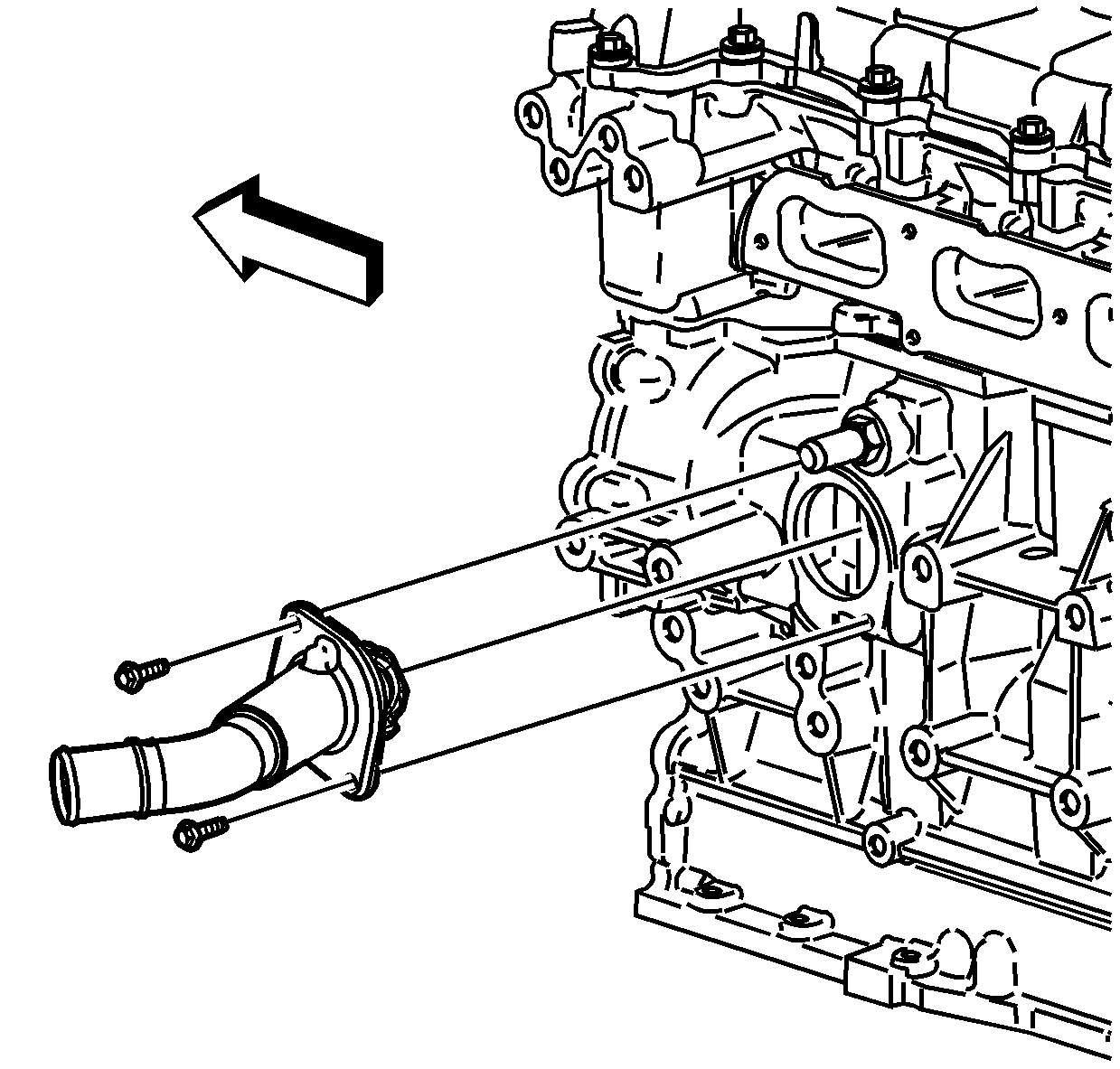
| 11.1. | Raise and support the vehicle only high enough to access the thermostat housing through the wheelhouse. Refer to Lifting and Jacking the Vehicle . |
| 11.2. | Place an approved container under the thermostat housing. |
| Important: Do not completely remove the thermostat housing. Complete removal of the thermostat housing will not provide steady drain path and will increase clean up time. |
| 11.3. | Loosen the thermostat housing bolts and slowly pull the thermostat housing back away from the engine. This will allow for a steady drain path for coolant. |
| 11.4. | Once coolant is drained remove the thermostat housing bolts, thermostat housing, and thermostat. Inspect and replace as necessary. |
| 11.5. | Clean and inspect the O-ring. Replace as necessary. |
| 11.6. | Clean and inspect the sealing surface of the engine block. |
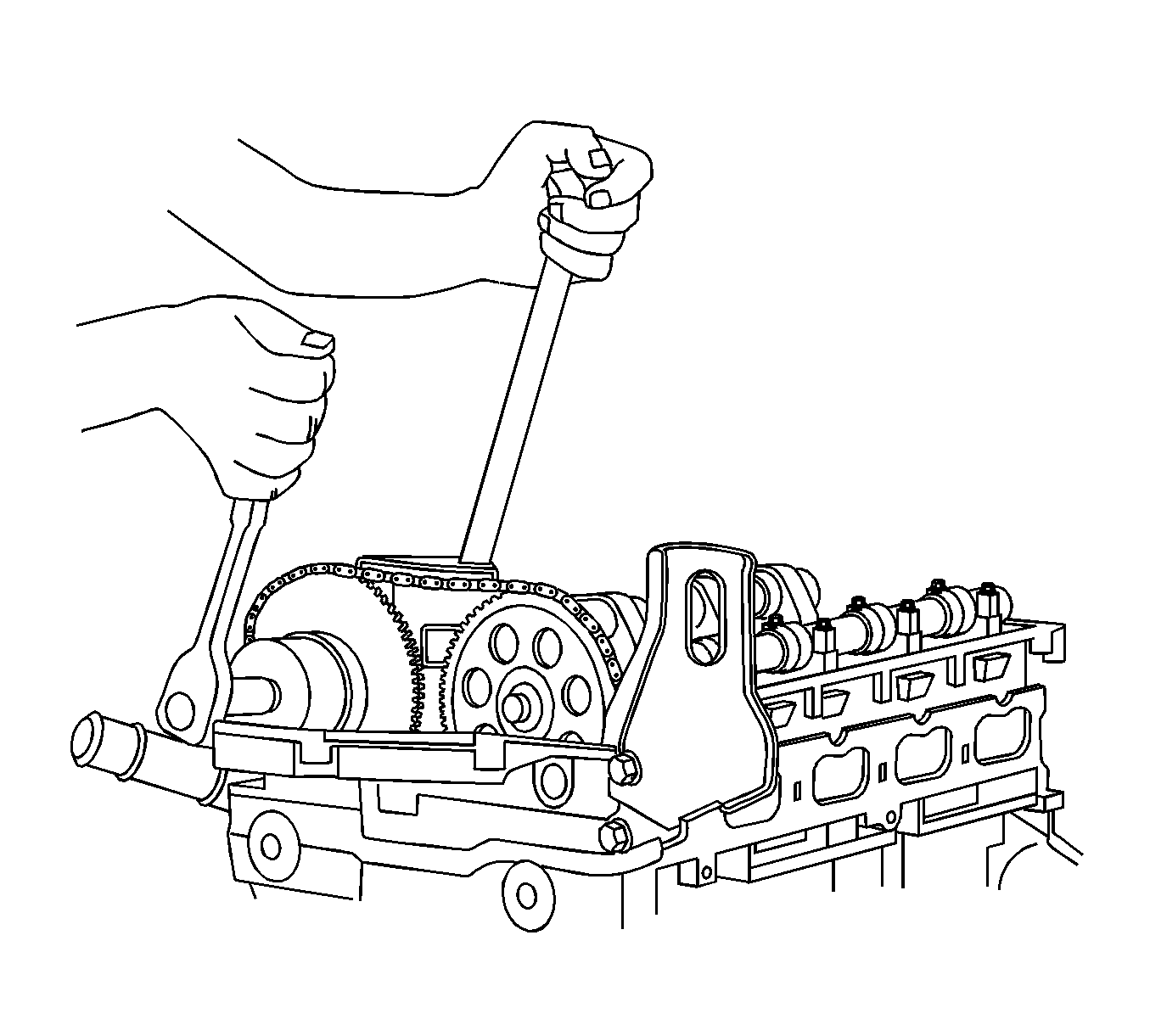
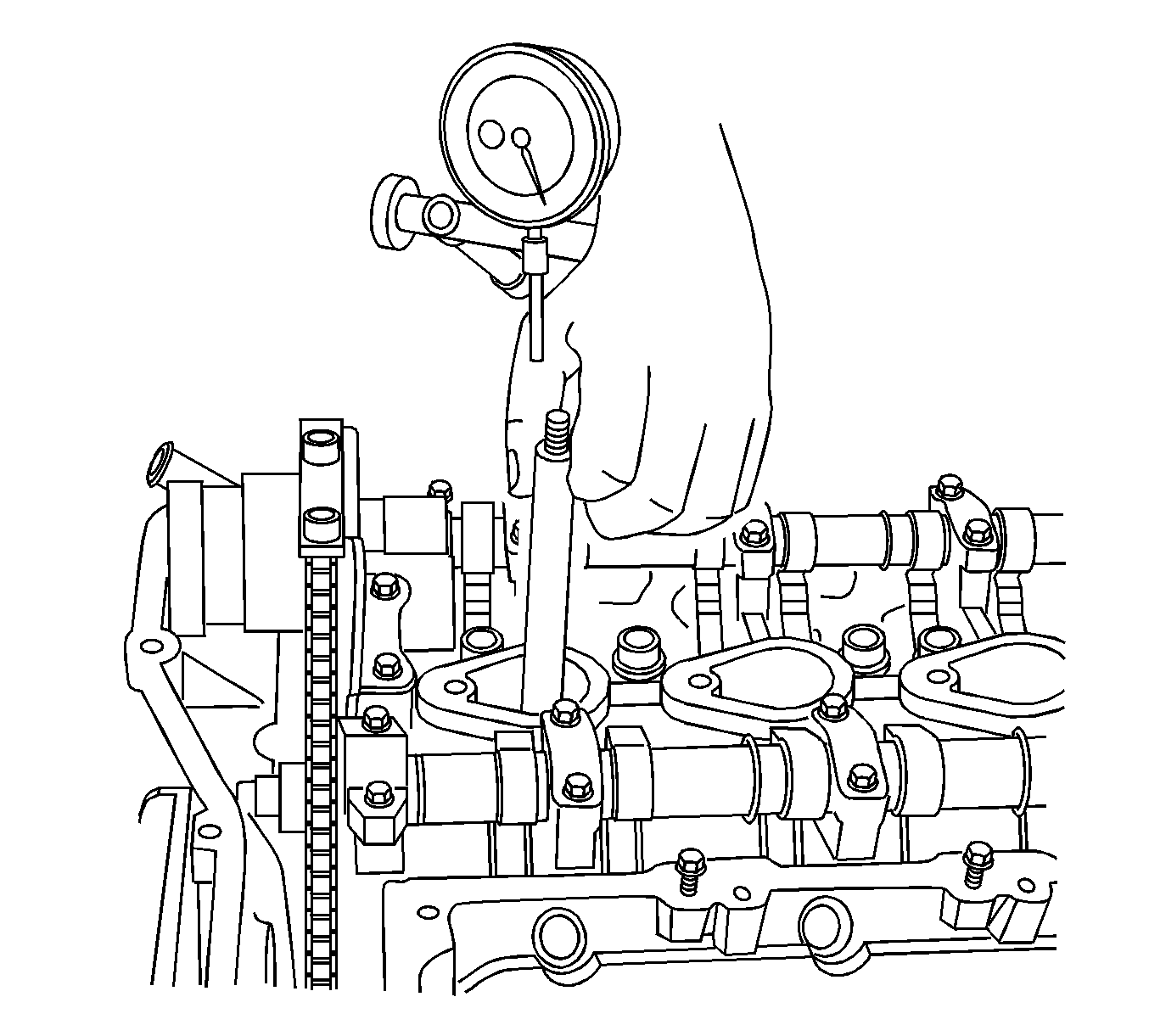
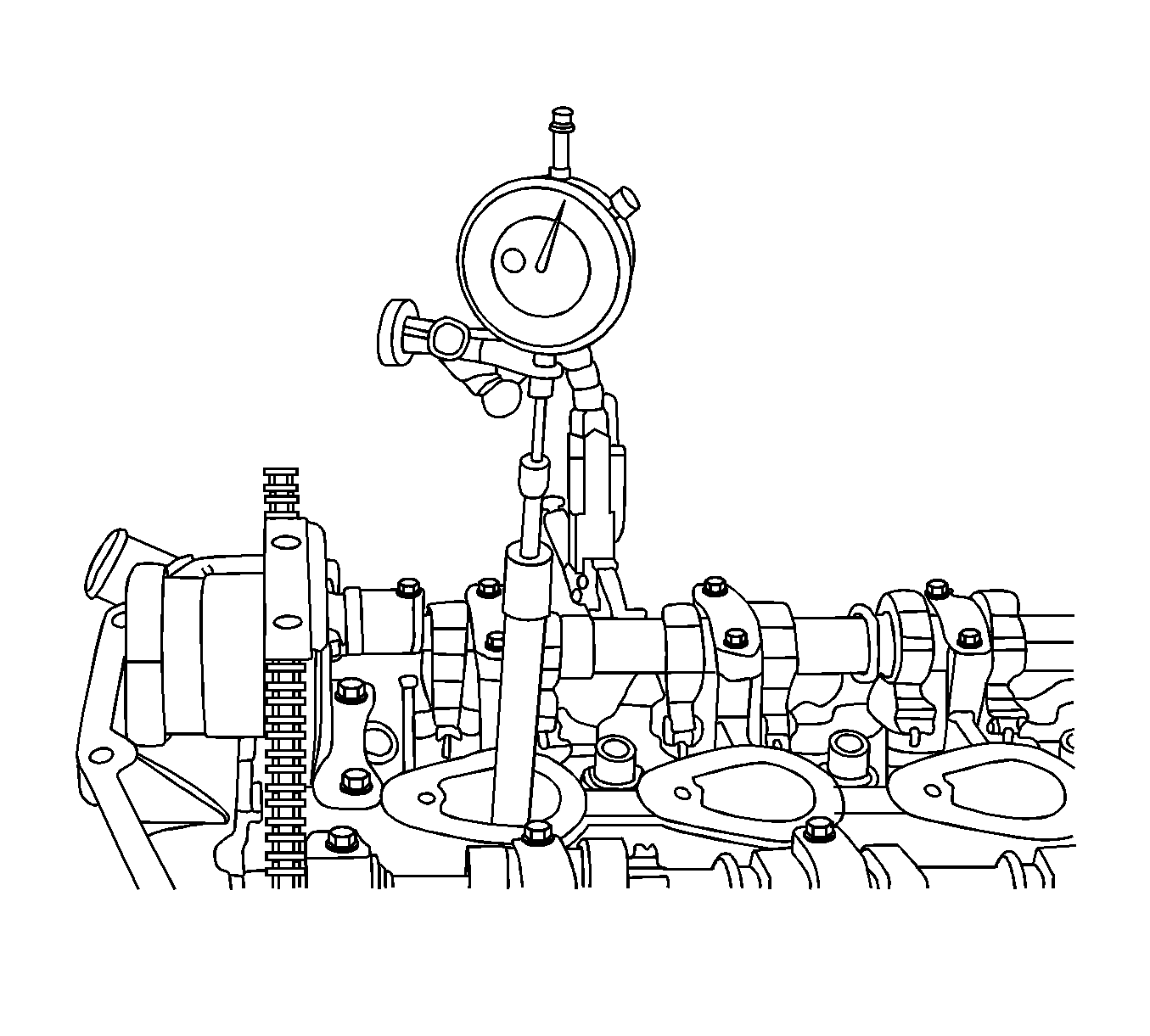
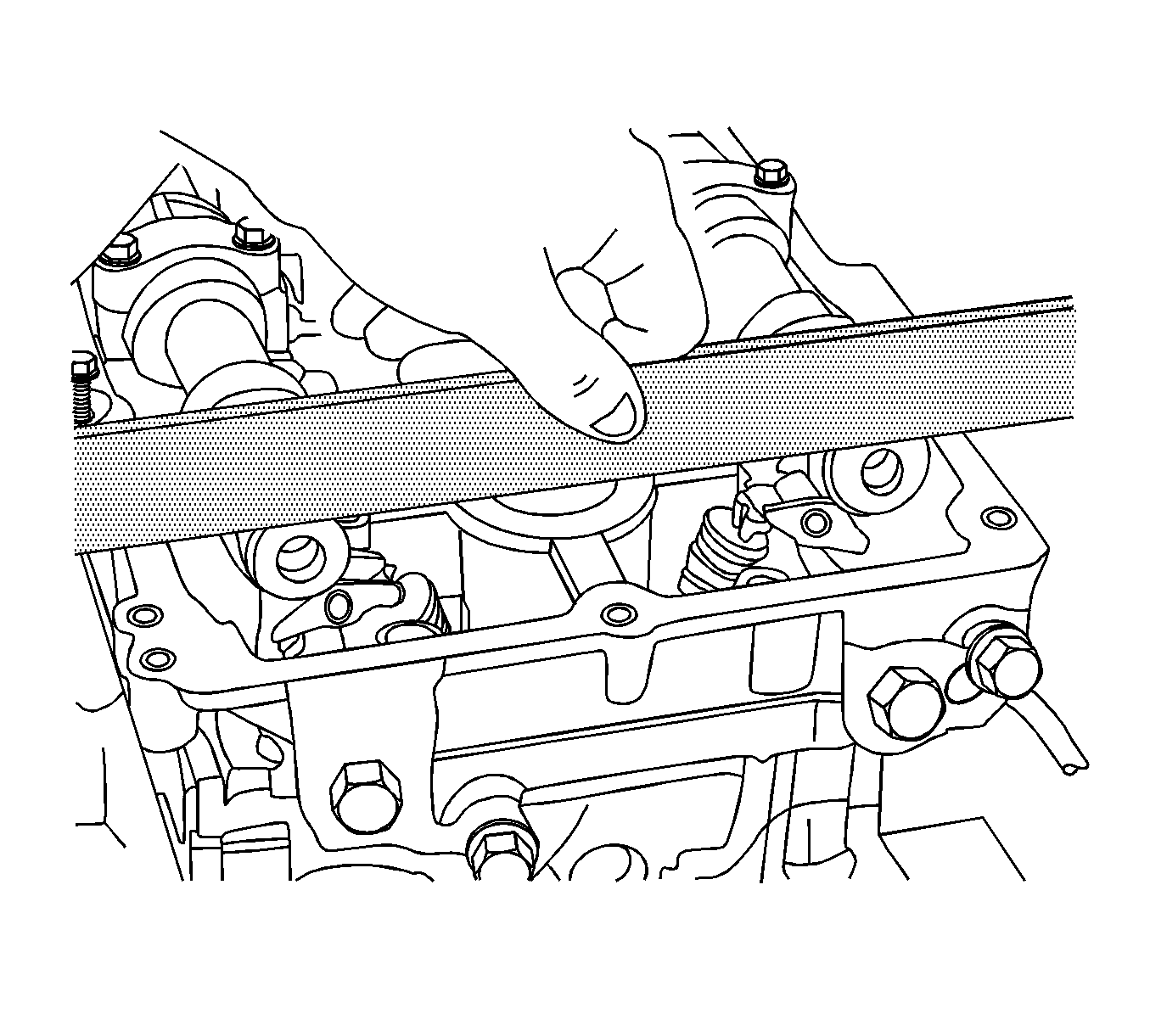
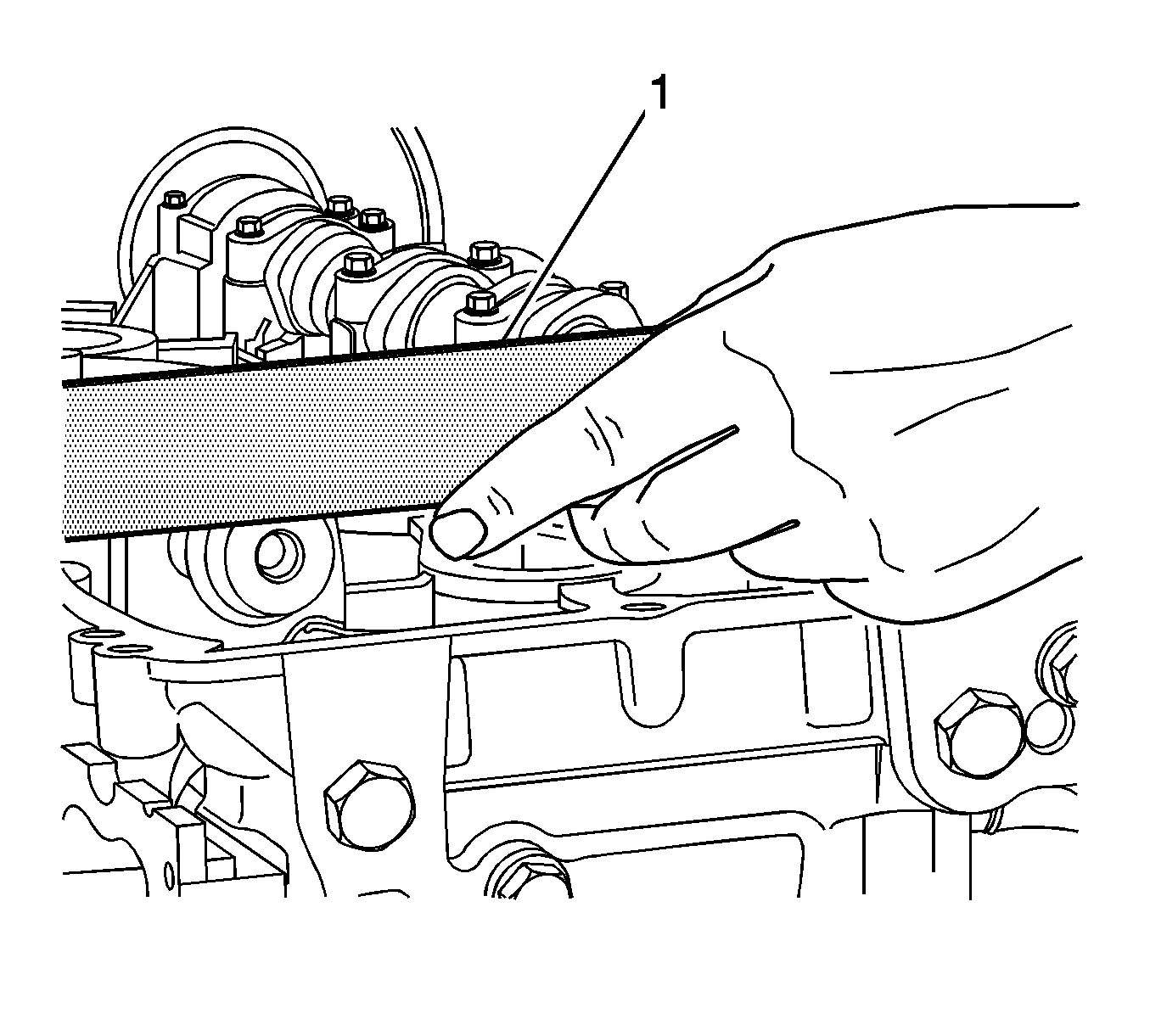
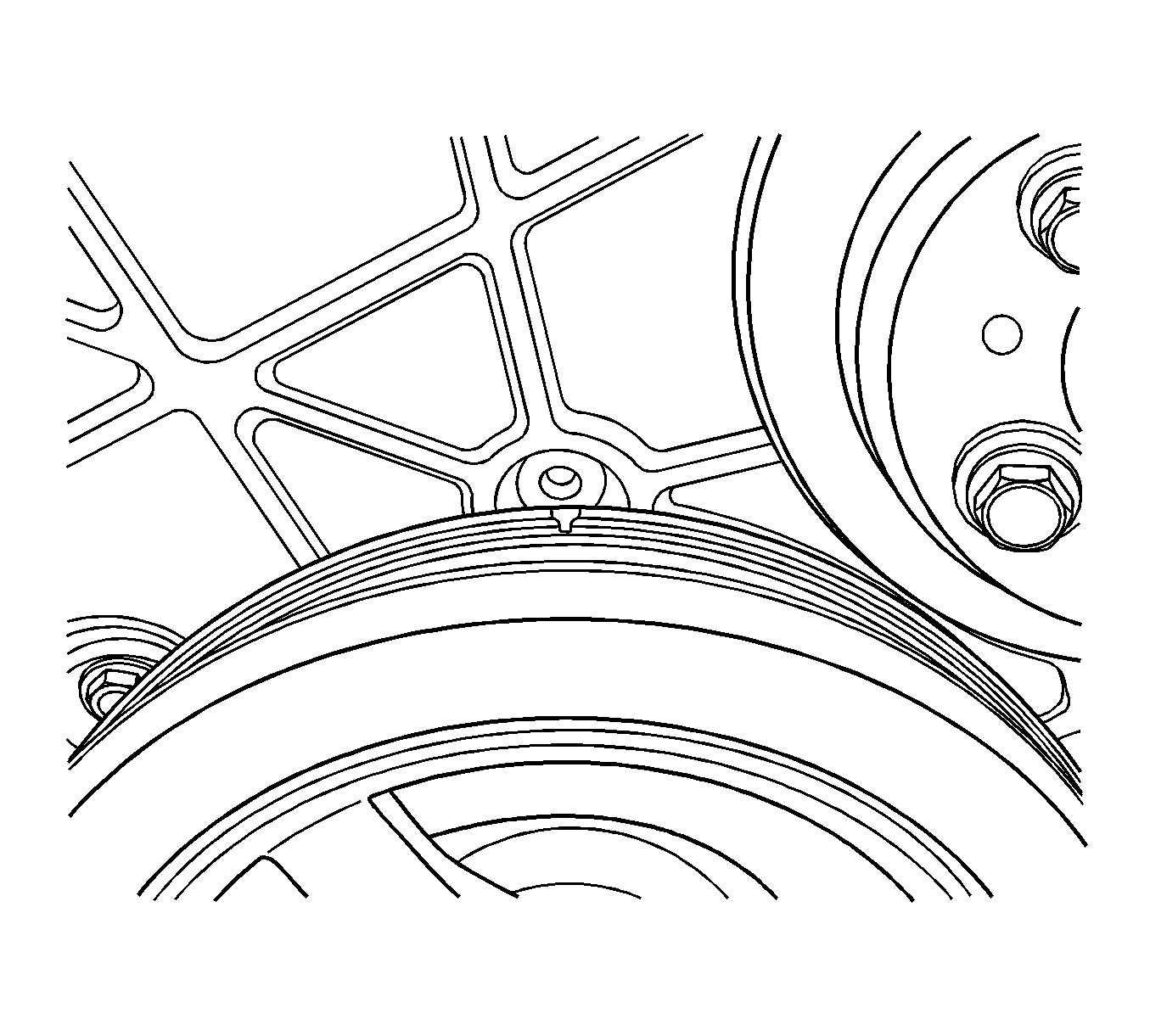
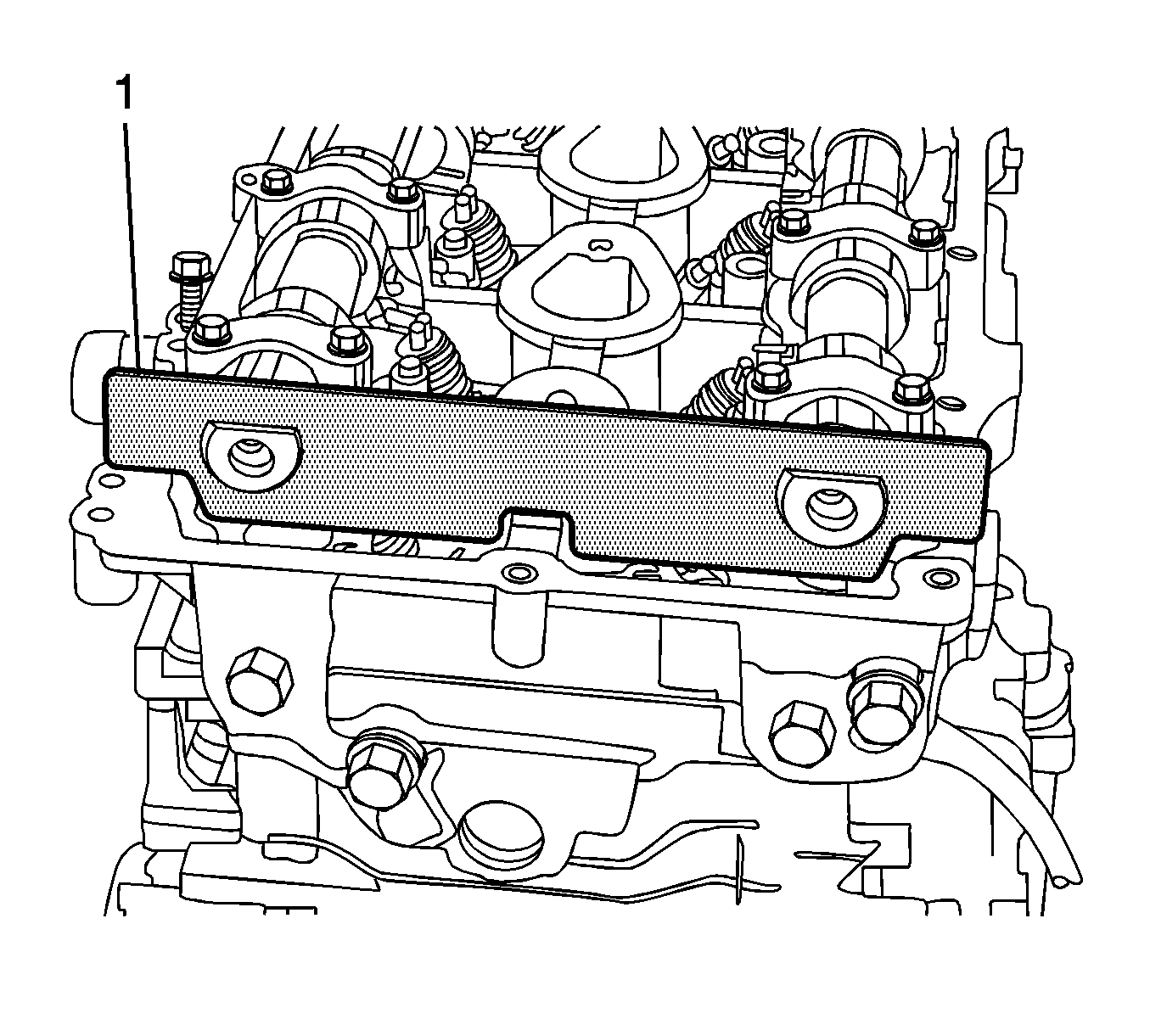
Caution: The camshaft holding tools must be installed on the camshafts to prevent camshaft rotation. When performing service to the valve train and/or timing components, valve spring pressure can cause the camshafts to rotate unexpectedly and can cause personal injury.
Important: If the timing is correct (TDC compression stroke number 1 cylinder), the camshaft flats will be in the up position.
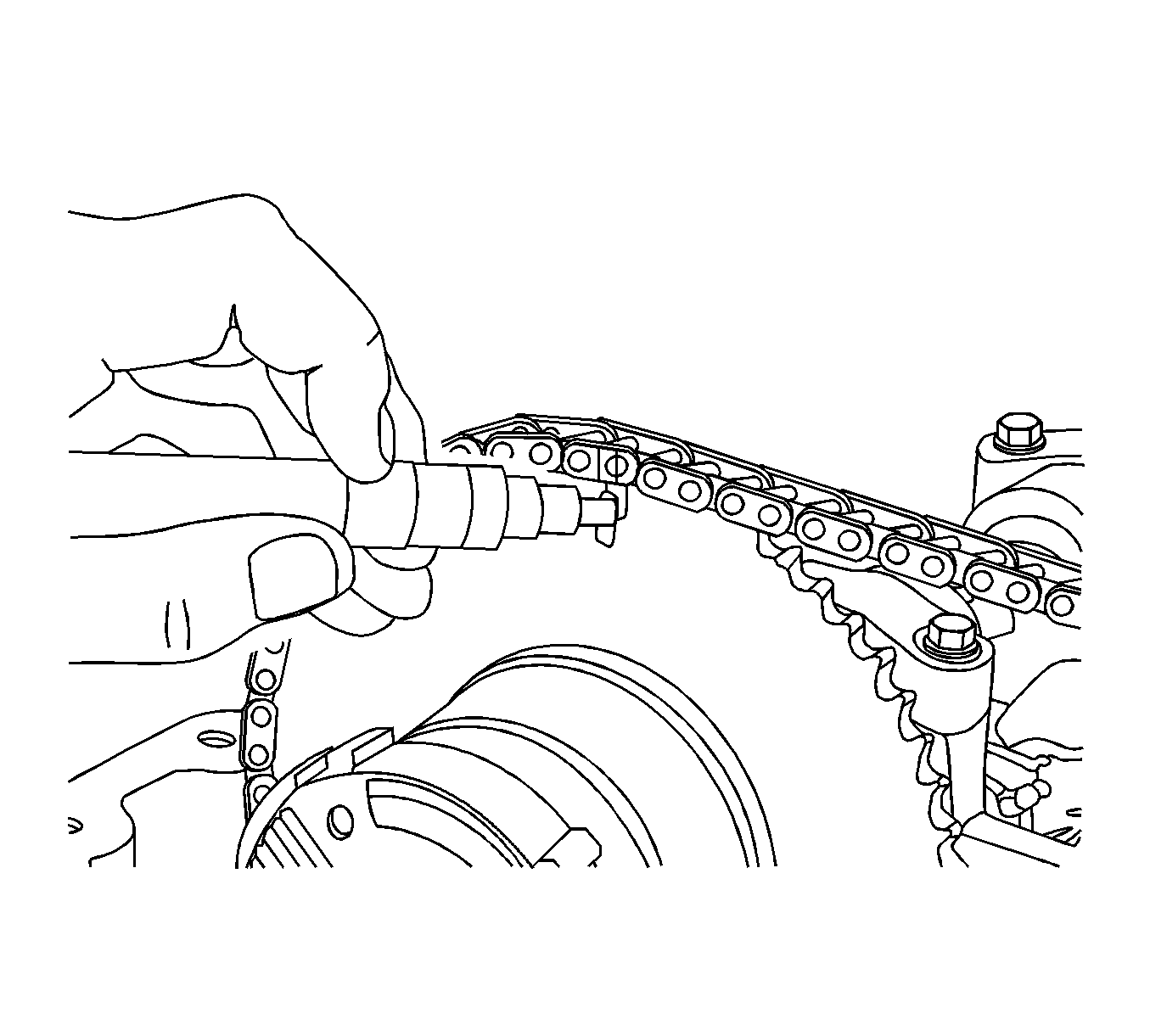
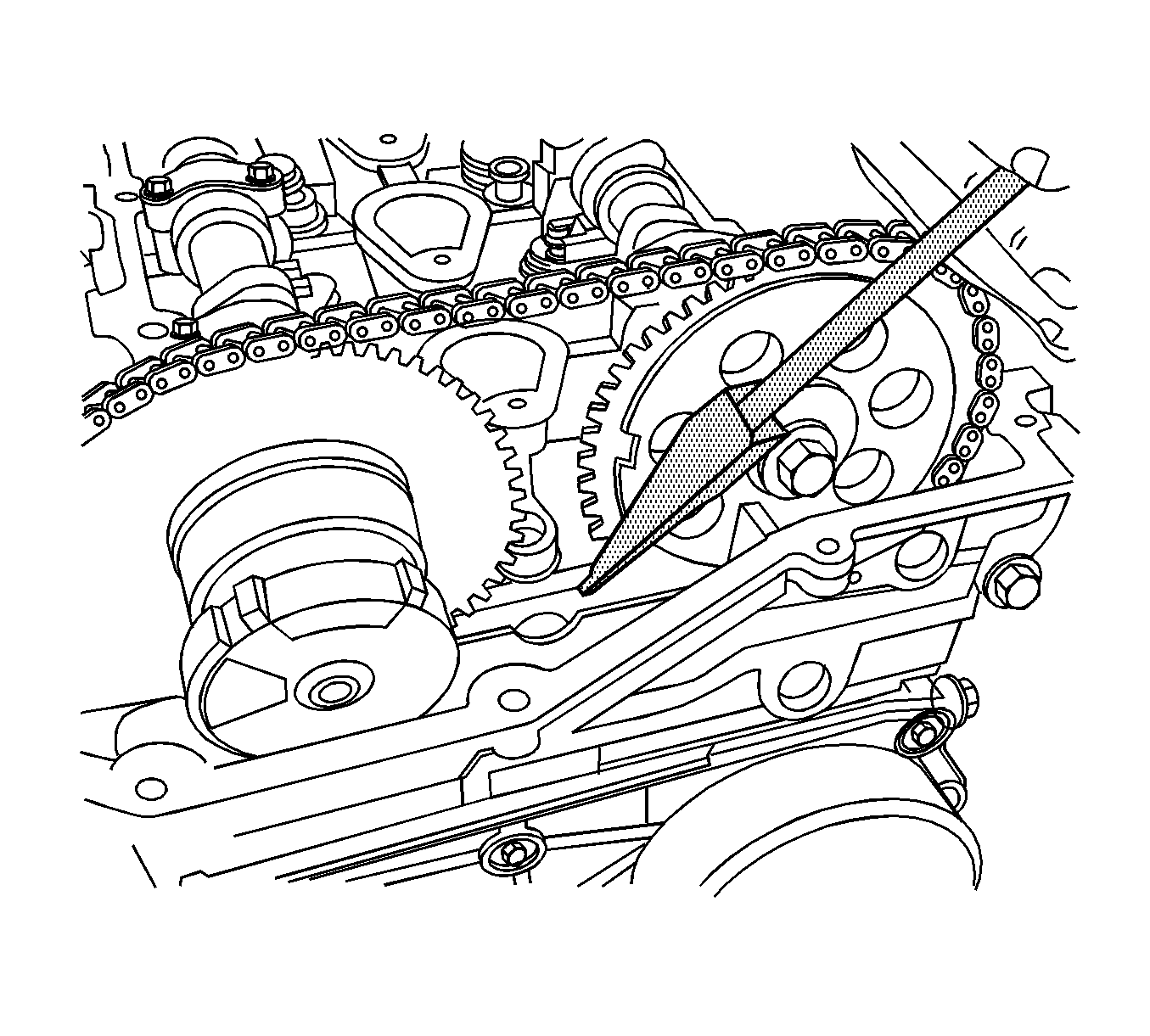
Notice: DO NOT use excessive force to seat the wedge tool. If excessive force is used, you may damage the timing chain tensioner or break the front cover bolt requiring complete disassembly of the front engine.
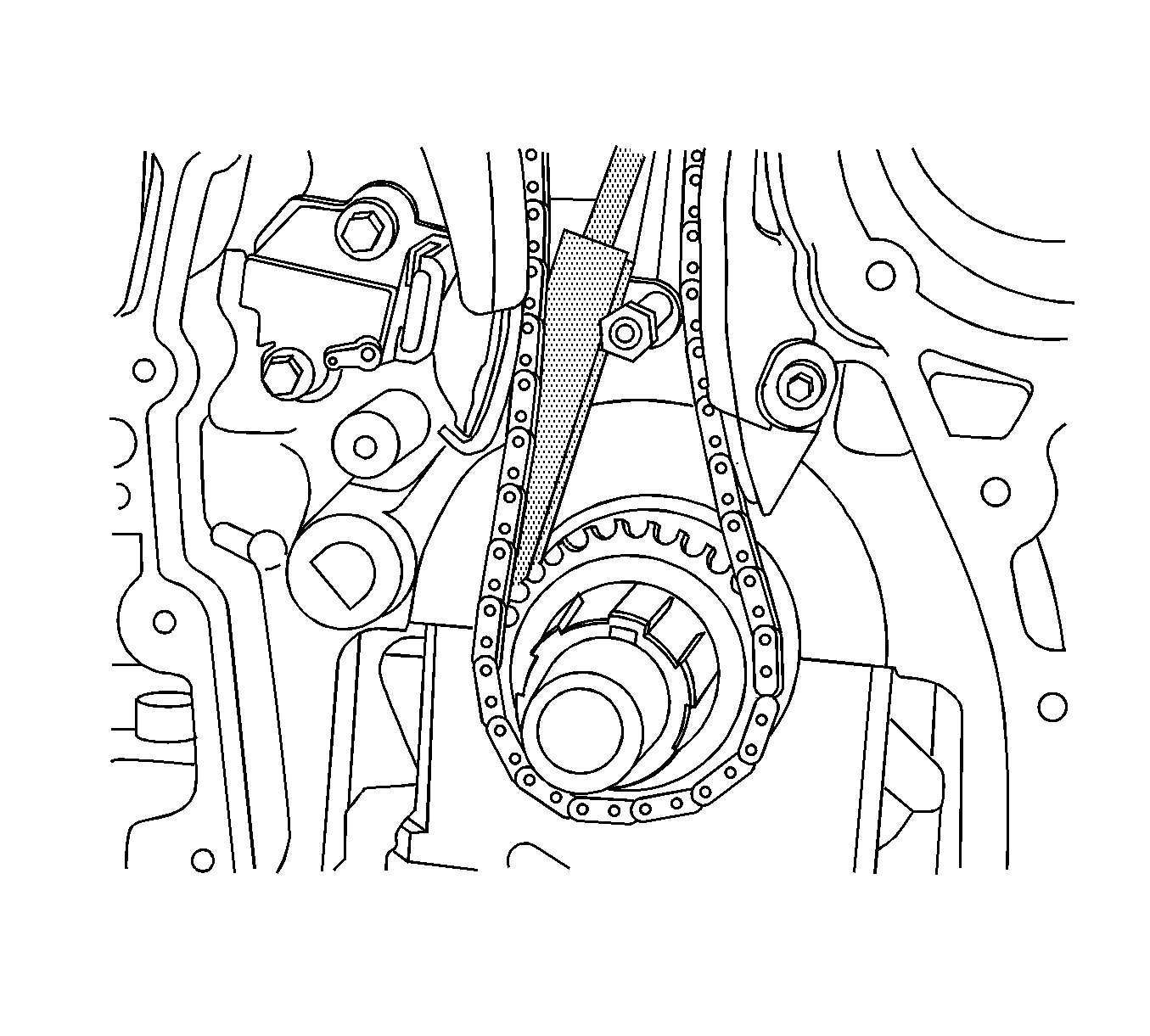
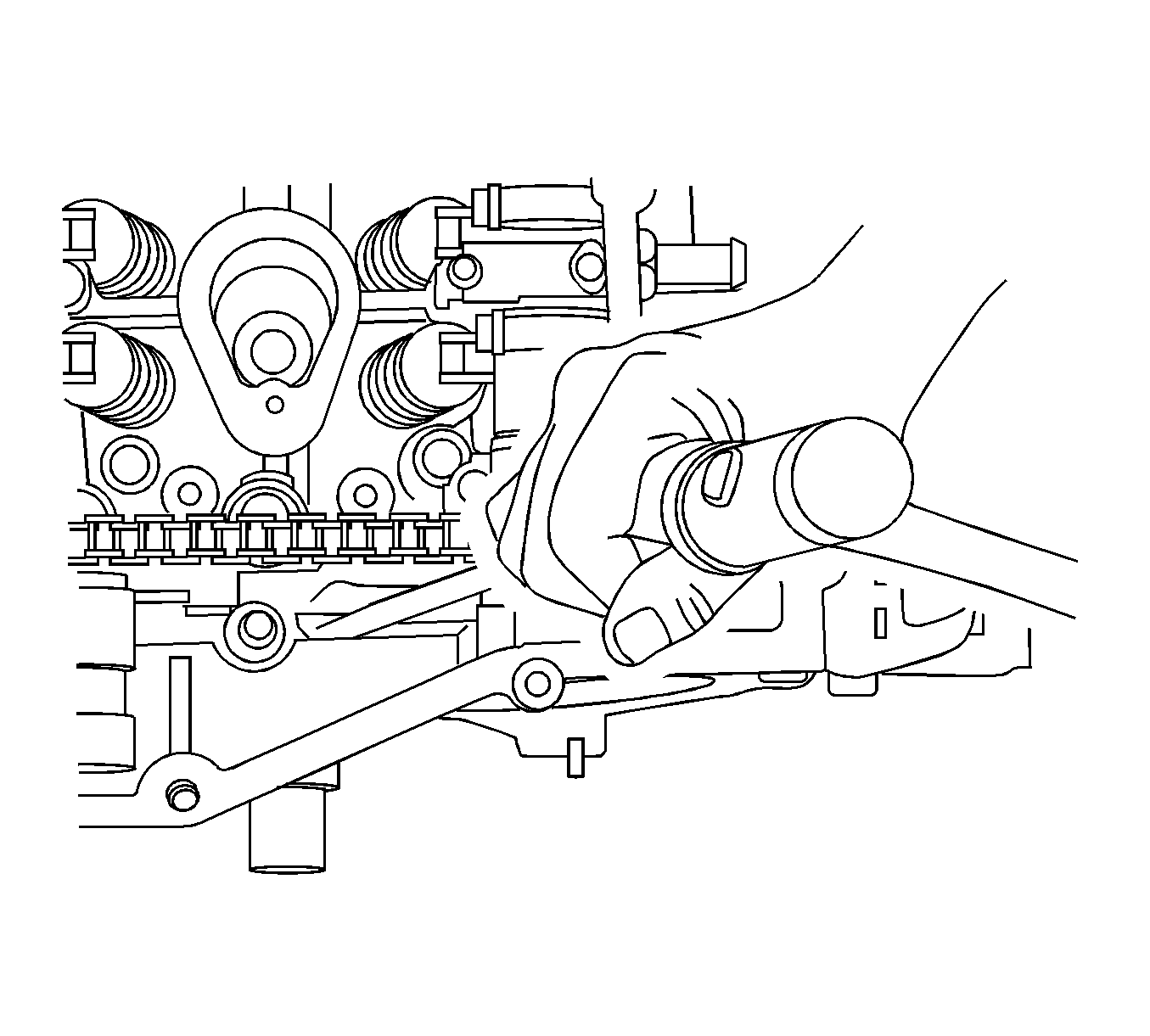
Important:
• Use a 25 mm (1 in) open end wrench on the camshaft hexes to hold the camshaft from turning. It is critical that the crankshaft does not move and is held at TDC when the intake and exhaust camshaft sprocket bolts are removed. • If the crankshaft is not held in place, the wedge tool could be dislodged. If the crankshaft moves, or if the tool is not seated properly allowing the timing chain tensioner to extend, the repair will have to be completed by removing the front cover
to release the timing chain tensioner.
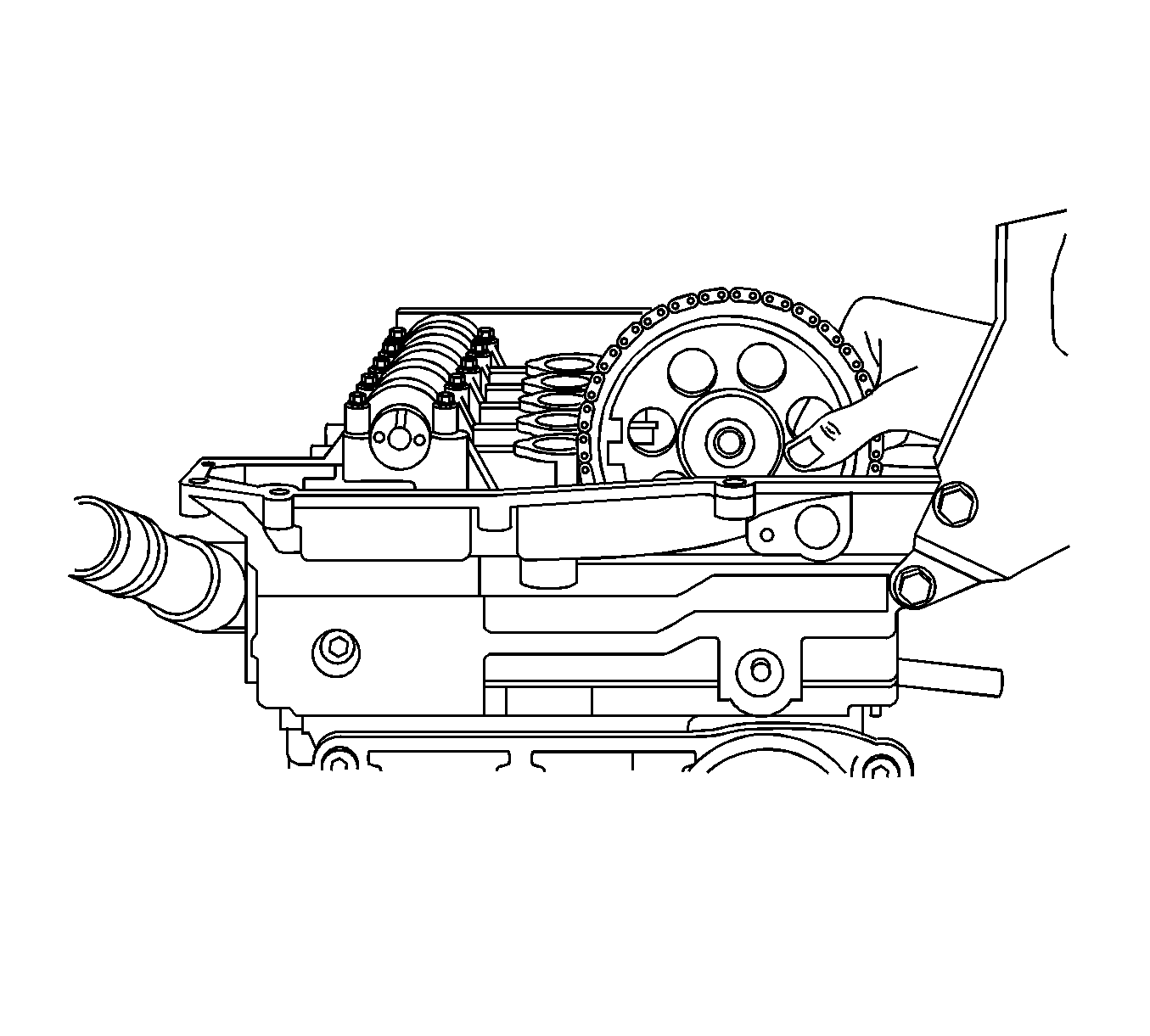
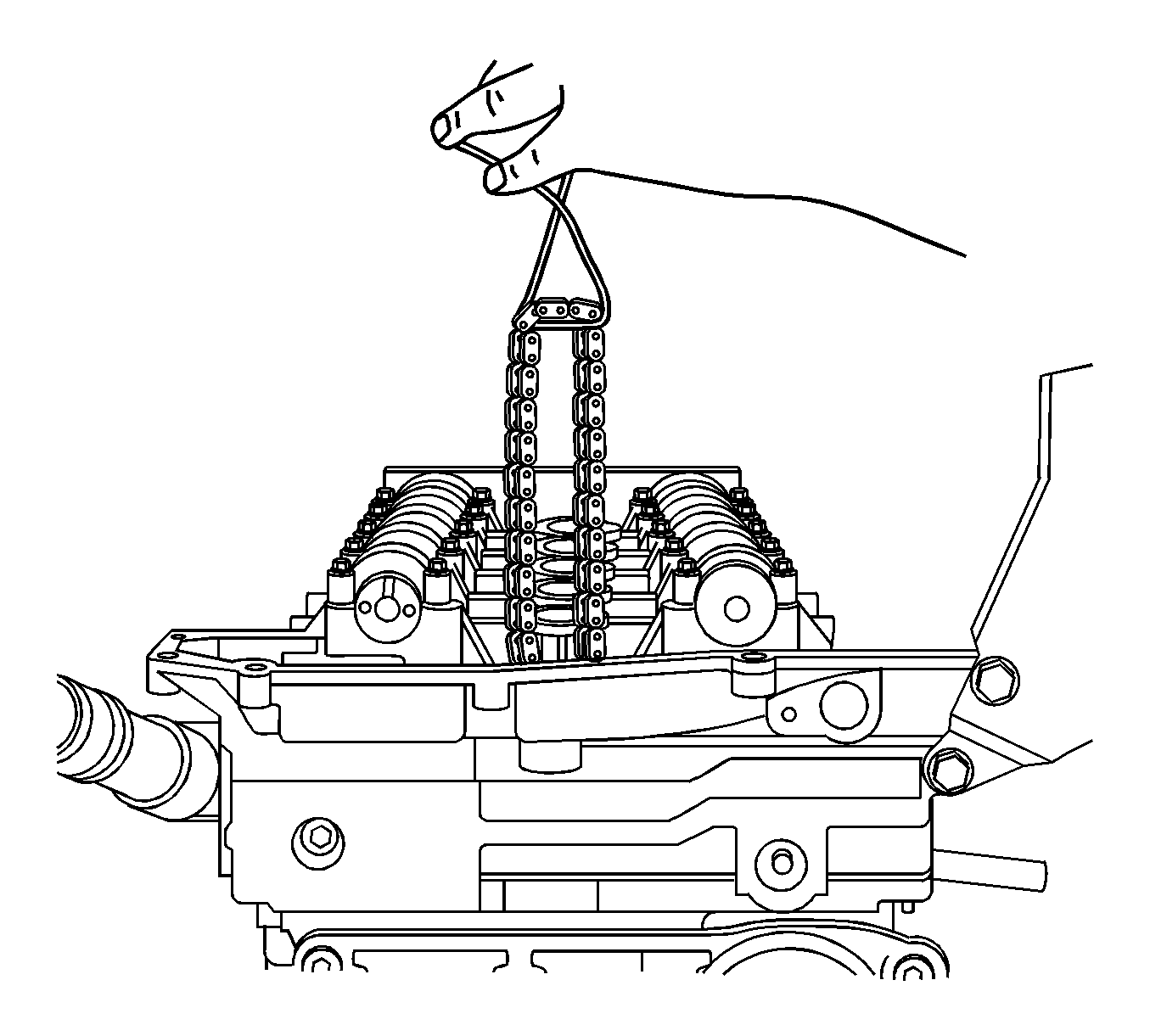
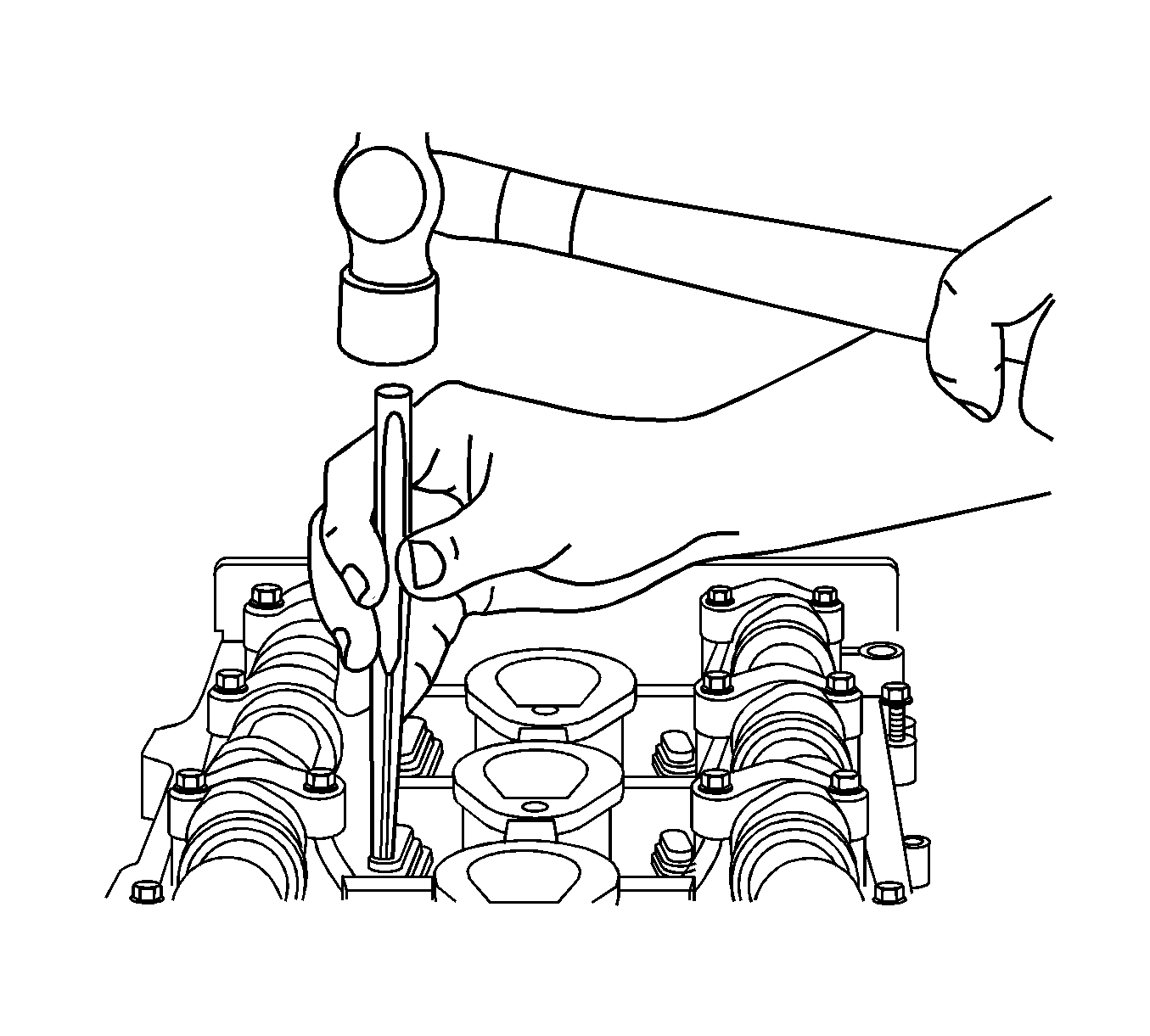
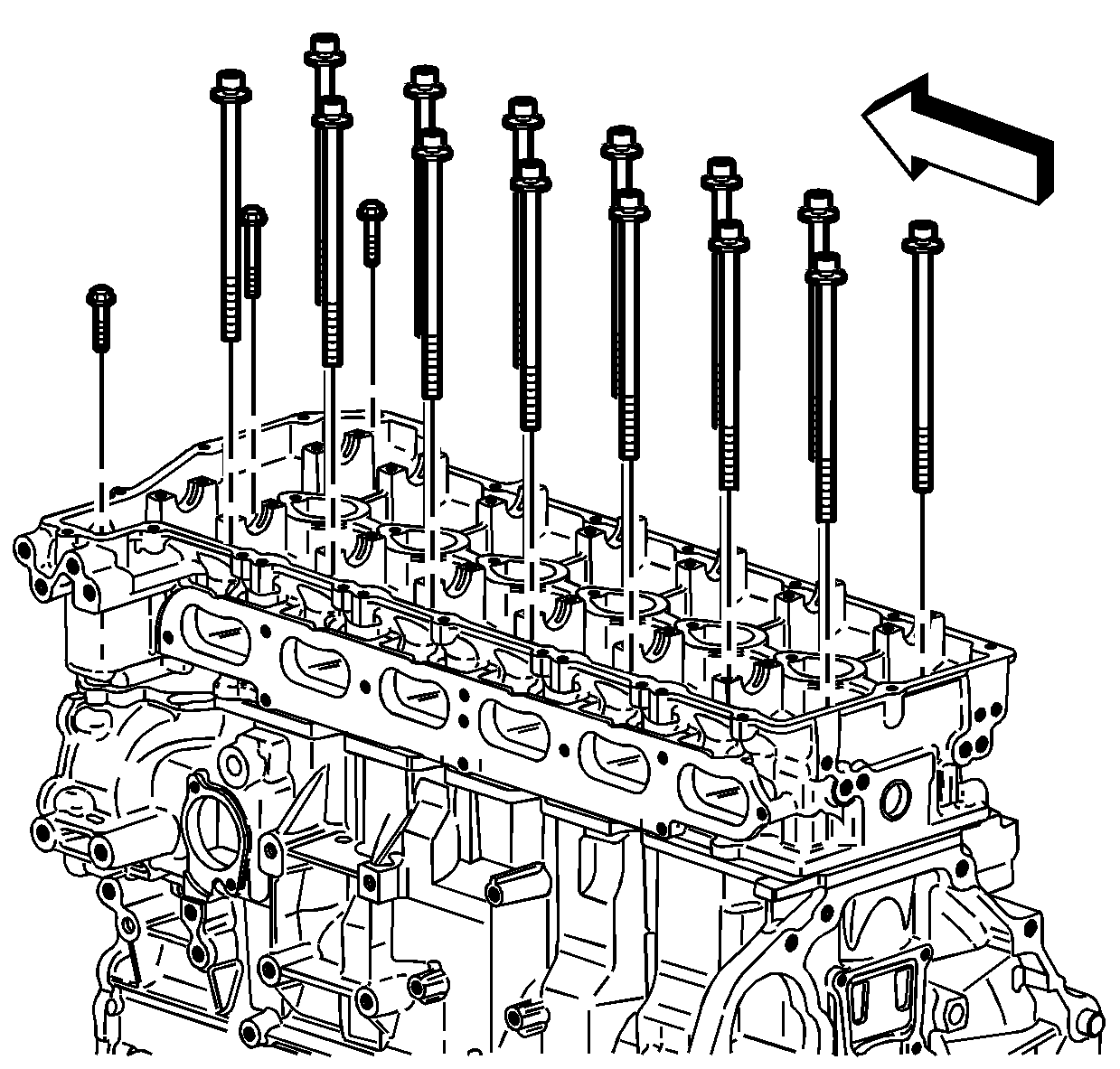
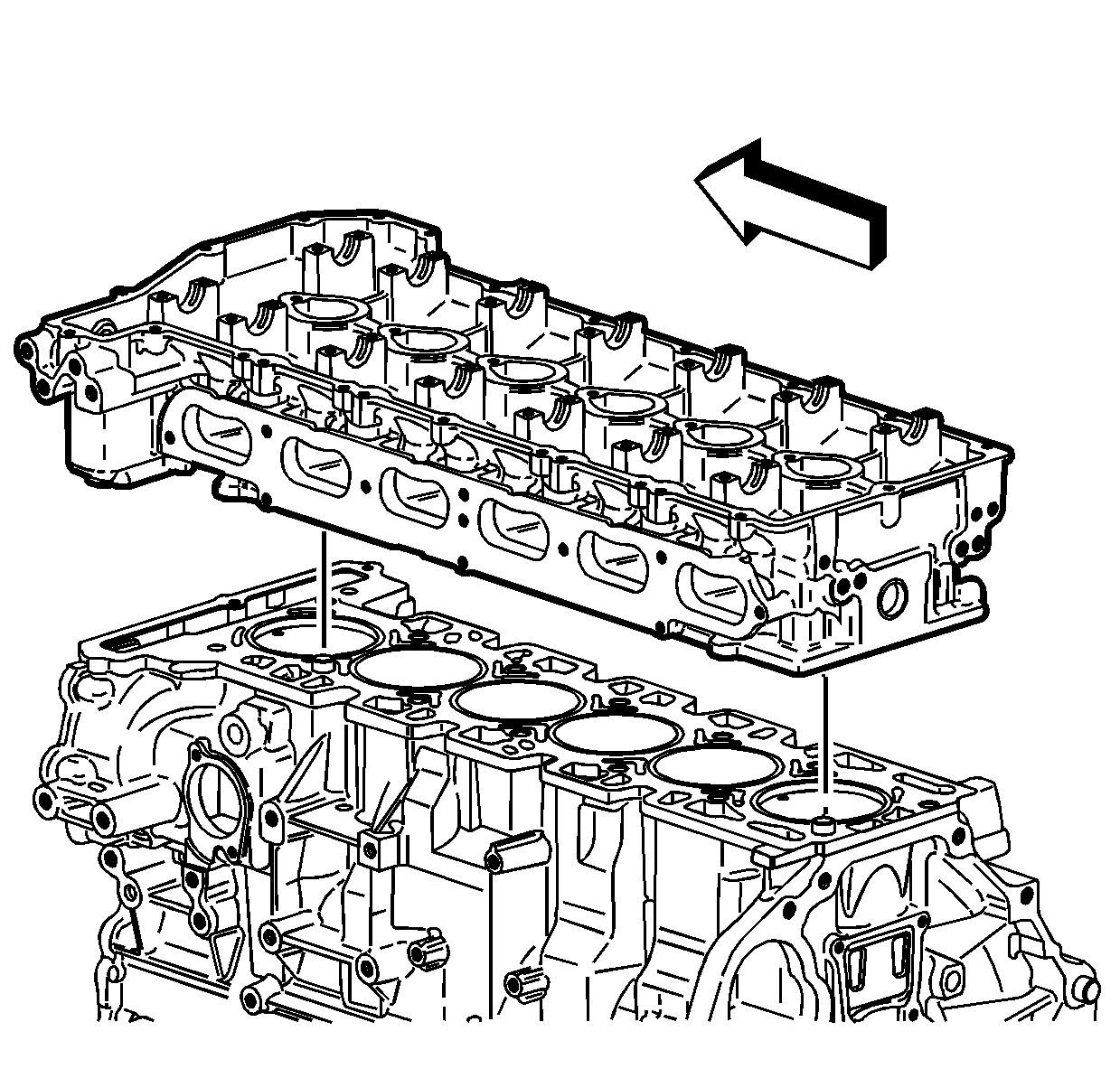
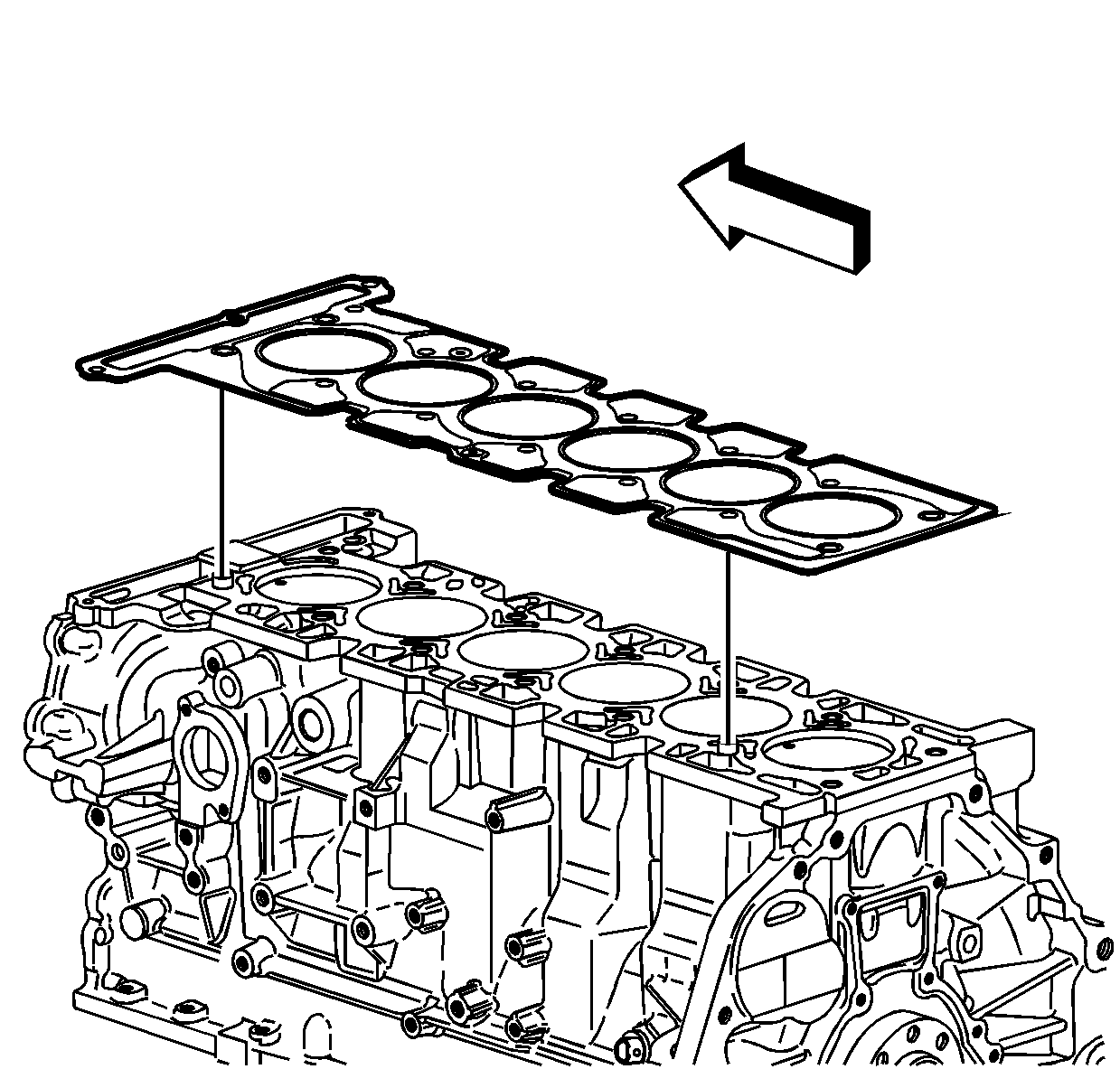
Discard the gasket.
Installation Procedure
- Assemble the cylinder head if necessary. Refer to Cylinder Head Assemble .
- Install the dowel pins, cylinder head locator, if necessary.
- Position a NEW cylinder head gasket to the engine block.
- Install the cylinder head.
- Install NEW cylinder head bolts.
- Tighten the NEW cylinder head bolts in the following sequence:
- Tighten the cylinder head bolts (1-14) in sequence to 30 N·m (22 lb ft).
- Tighten the two short end bolts to 7 N·m (62 lb in).
- Tighten the one long end bolt to 7 N·m (62 lb in).
- Install the camshafts with the flats up using J 44221 . Refer to Camshaft Installation .
- Ensure that the camshaft position actuator is in the fully advanced position. Refer to Camshaft Position Actuator Diagnosis .
- Install the exhaust camshaft actuator/sprocket and chain onto the exhaust camshaft. Use the paint marks as an alignment guide.
- Install the intake camshaft sprocket and chain onto the intake camshaft. Use paint marks as alignment guide.
- Position the timing chain tensioner shoe to the engine.
- Install the timing chain tensioner shoe bolt.
- Position the lower timing chain guide to the engine.
- Install the lower timing chain guide bolts.
- Install both upper timing chain tensioner shoe bolts.
- Install both upper cylinder head access hole plugs to the front of the cylinder head.
- Tighten the new intake camshaft sprocket bolt.
- Tighten the new exhaust camshaft actuator sprocket bolt.
- Remove the J 44221 from the back of the camshafts.
- Install the handle of EN-48464 and remove the wedge portion of the tool from the engine.
- Rotate the engine clockwise by hand two complete revolutions to TDC number 1 on the compression stroke. Refer to First Method or Second Method for TDC. If you go past TDC, rotate the engine back approximately 45 degrees before TDC and then rotate clockwise up to TDC to ensure that the timing chain is tight (no slack) between the crank sprocket and the timing gears.
- Both intake and exhaust camshaft flats should be facing up and flat and level with the cylinder head. If J 44221 is used to verify cam timing, you could be off approximately one tooth and cause DTC P0016 to set. If a worn or new J 44221 is used to verify timing, the timing will be off.
- To verify timing, set a straight edge across the flats of the camshafts.
- A 0.005 inch feeler gage should not be able to slip under the straight edge (1). If the feeler gage slips under one or both camshaft flats, then the timing is off. Repeat step 20 and recheck. If the camshaft flats are still not flat, the camshaft timing will have to be reset. This may require removal and reinstallation of one or both camshaft sprockets.
- Install the 1 long and 2 short cylinder head bolts next to the exhaust and intake timing chain tensioner shoes and tighten the bolts.
- Position the upper timing chain guide to the cylinder head. Apply threadlocker GM P/N 89021297 (Canadian P/N 10953488) to the upper timing chain guide bolt threads.
- Install the upper timing chain guide bolts.
- Install the radiator inlet hose and clamp to the cylinder head. Refer to Radiator Inlet Hose Replacement .
- Clean and inspect the camshaft cover. Refer to Camshaft Cover Cleaning and Inspection .
- Install a NEW camshaft cover seal and NEW ignition control module seals to the cam cover. Position the camshaft cover to the cylinder head.
- Install the camshaft cover bolts.
- Check the gap on all of the spark plugs. The gap should be 1.08 mm (0.042 in). Tighten all of the spark plugs.
- Install the ignition coils (1) into the camshaft cover.
- Install the ignition coil bolts (2).
- Reposition the exhaust manifold to cylinder head and install the exhaust manifold bolts to the cylinder head. Refer to Exhaust Manifold Replacement .
- If equipped, install a NEW AIR injection gasket, then the cover and pipe studs to the cylinder head.
- Install the exhaust manifold heat shield to the exhaust manifold.
- Apply anti-seize GM P/N 12371386 (Canadian P/N 89021945) to the exhaust manifold heat shield nuts.
- Install the exhaust manifold heat shield nuts.
- Install the intake manifold to the cylinder head. Refer to Intake Manifold Replacement .
- Reposition the engine wiring harness bracket to the engine and harnesses. Install the engine wiring harness bracket bolts.
- Install the left front wheelhouse panel and the left wheel and tire. Refer to Wheelhouse Panel Replacement .
- Drain the engine oil again.
- If removed, install the radiator outlet hose. Refer to Radiator Outlet Hose Replacement .
- Install the cross-vehicle wiring harness connectors to the following components:
- Install the PCV pipes to the intake manifold. Refer to Positive Crankcase Ventilation Hose/Pipe/Tube Replacement .
- Reposition the Fuel/EVAP lines to the intake manifold retainer. Refer to Evaporative Emission Hoses/Pipes Replacement - Engine/Chassis .
- Install the following components:
- Install the air cleaner element and resonator. Refer to Air Cleaner Element Replacement and Air Cleaner Outlet Resonator Replacement .
- Install NEW engine oil. Refer to Engine Mechanical Specifications .
- Install NEW coolant. Refer to Cooling System Draining and Filling .
- Install a scan tool and start the engine.


Important: Ensure all wires, components, etc. are out of the way when installing the cylinder head.

Notice: This component uses torque-to-yield bolts. When servicing this component do not reuse the bolts, New torque-to-yield bolts must be installed. Reusing used torque-to-yield bolts will not provide proper bolt torque and clamp load. Failure to install NEW torque-to-yield bolts may lead to engine damage.
Notice: Refer to Fastener Notice in the Preface section.
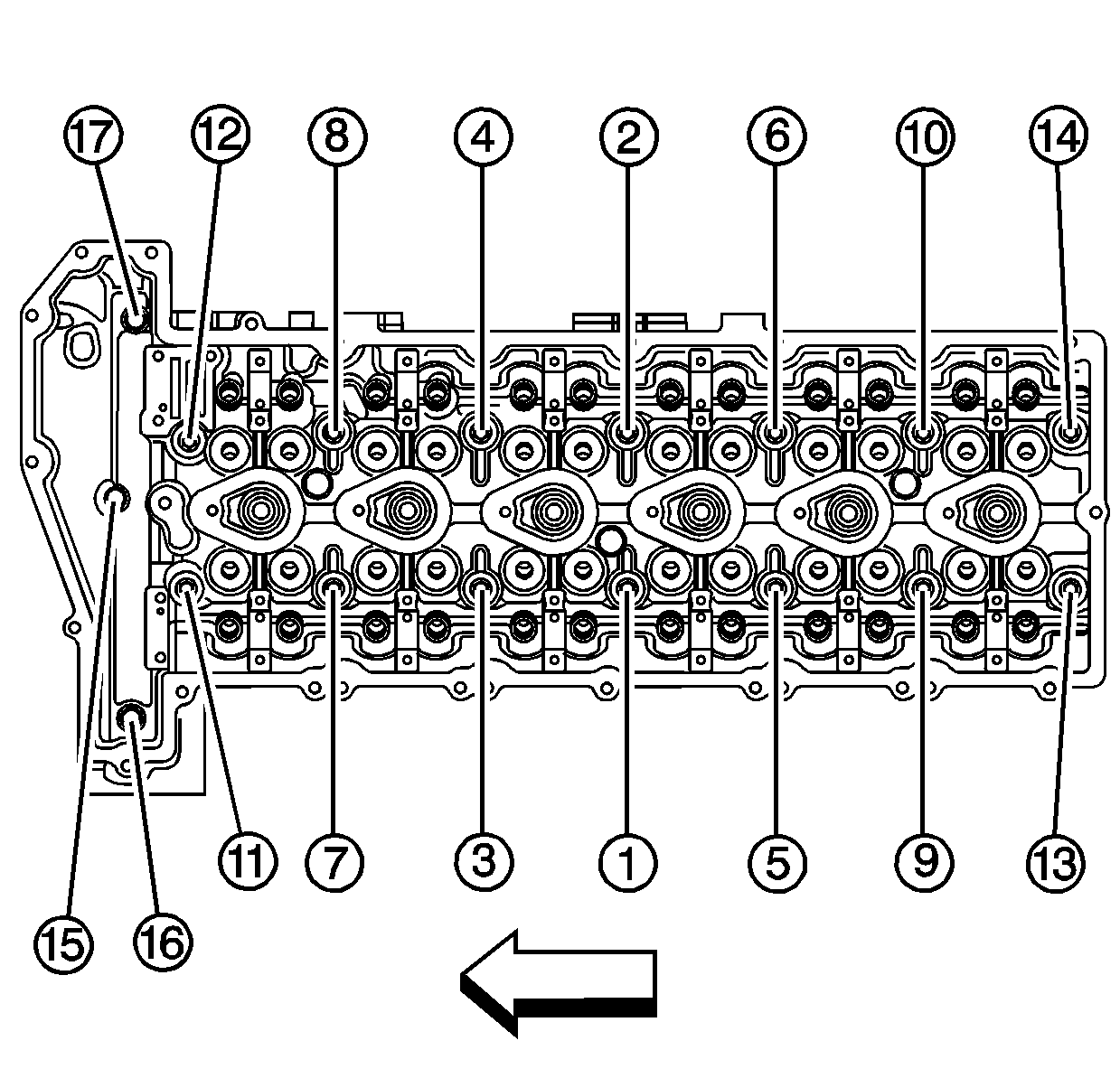
Tighten
Use the J 45059 to rotate the cylinder head bolts (1-14) in sequence an additional 155 degrees.
Use the J 45059 to rotate the short cylinder head end bolts an additional 60 degrees.
Use the J 45059 to rotate the long cylinder head end bolt an additional 120 degrees.

Caution: The camshaft holding tools must be installed on the camshafts to prevent camshaft rotation. When performing service to the valve train and/or timing components, valve spring pressure can cause the camshafts to rotate unexpectedly and can cause personal injury.
Important: Before installing the camshafts, refer to Camshafts Cleaning and Inspection .
Notice: Tension must be always kept on the intake side of the timing chain to properly keep the engine in time. If the chain is loose the timing will be off, which may cause internal engine damage or set DTC P0016.
Notice: The exhaust camshaft actuator must be fully advanced during installation. Engine damage may occur if the camshaft actuator is not fully advanced.
Important: To aid in aligning the actuator to the camshaft, use a 25 mm (1 in) open end wrench on the hex of the camshaft to rotate. This will ensure the alignment pin is properly engaged with the camshaft and hand tighten the new exhaust camshaft sprocket bolt.
Important: To aid in aligning the intake sprocket to the camshaft, use a 25 mm (1 in) open end wrench on the hex of the camshaft to rotate. This will ensure the alignment pin is properly engaged with the camshaft and hand tighten the new intake camshaft sprocket bolt.
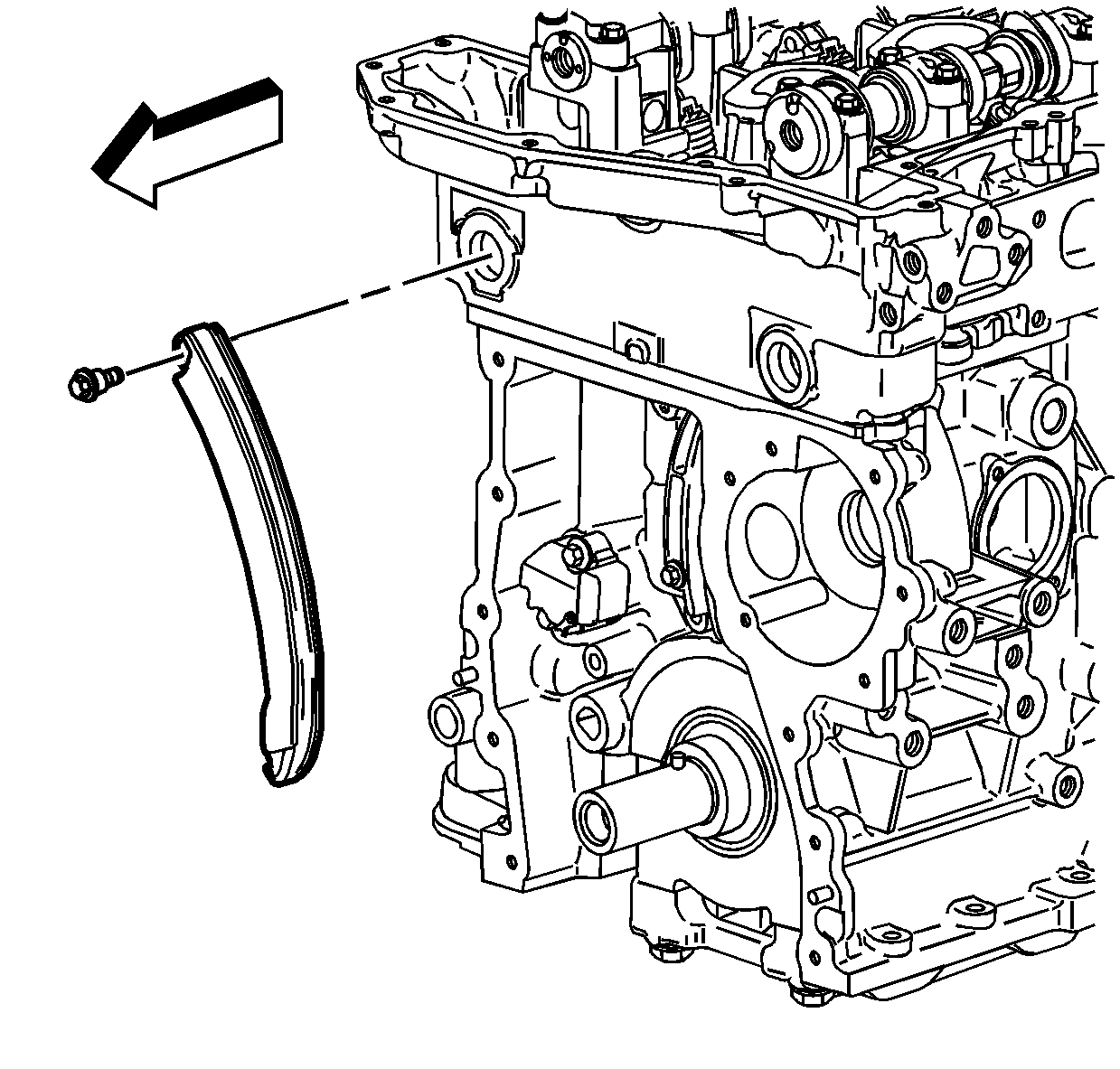
Tighten
Tighten the timing chain tensioner shoe bolt to 25 N·m (18 lb ft).
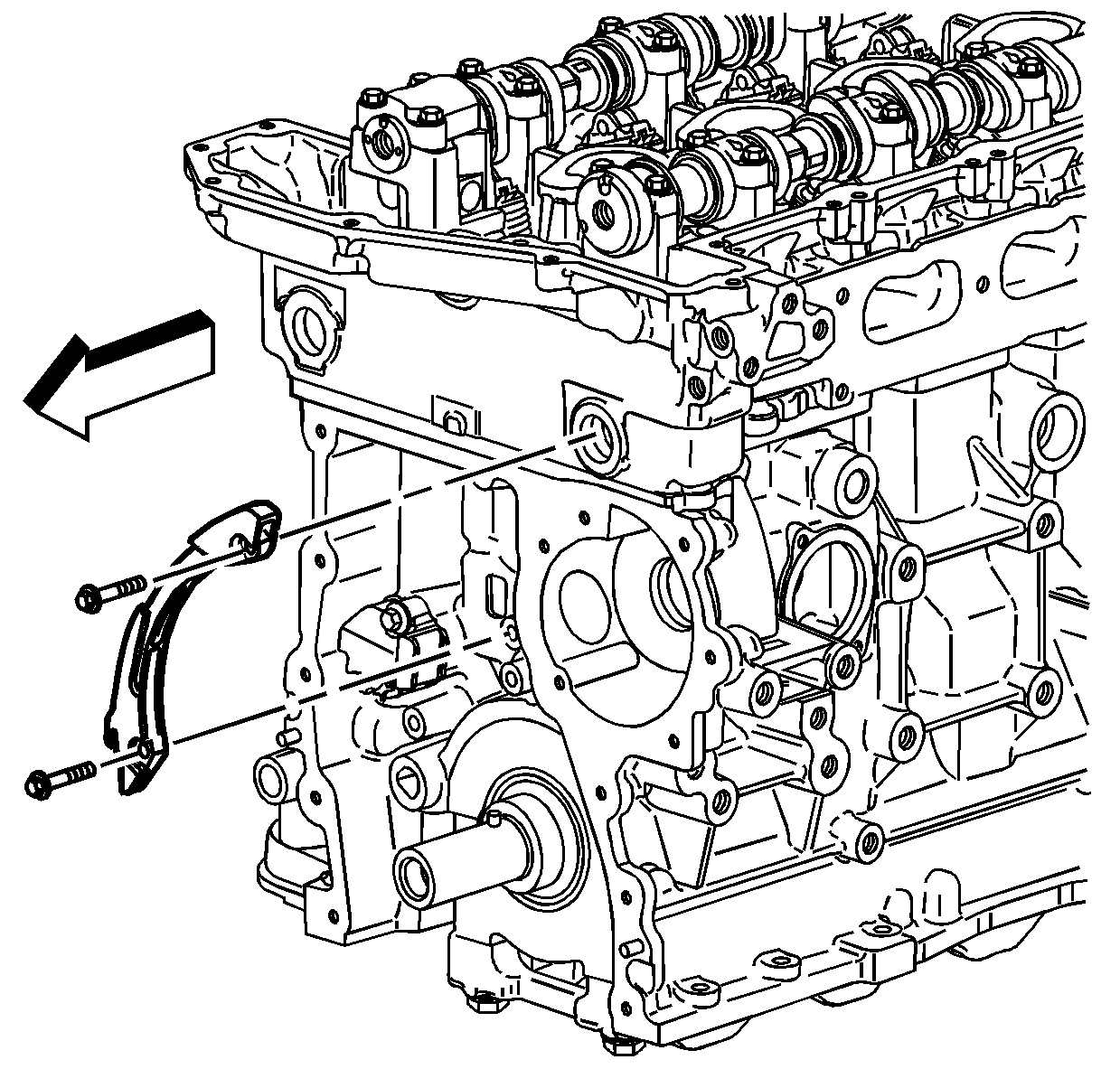
Tighten
Tighten the lower timing chain guide bolts to 12 N·m (107 lb in).
Tighten
Tighten the tensioner shoe bolts to 25 N·m (18 lb ft).
Tighten
Tighten the plugs to 5 N·m (44 lb in).
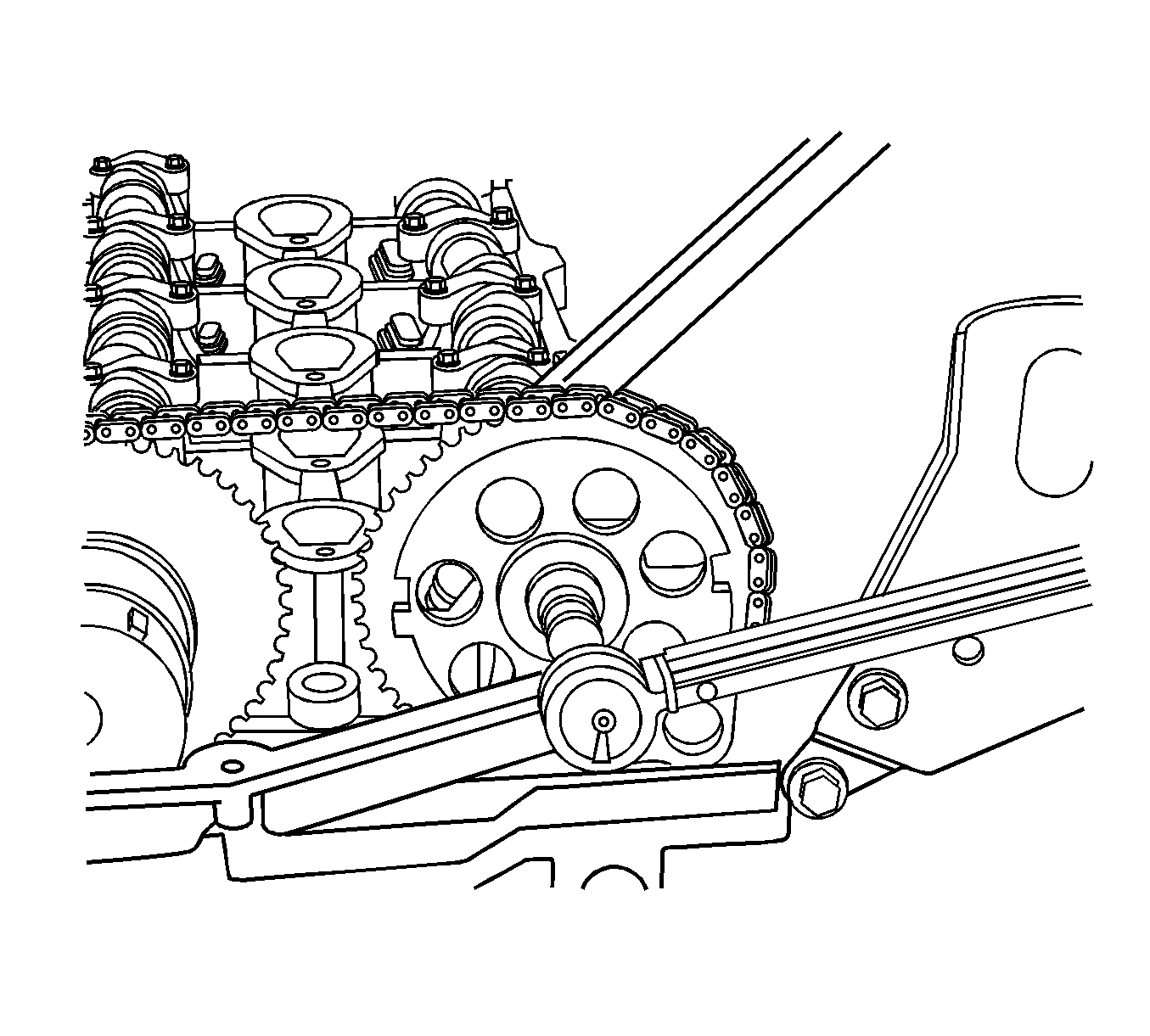
Tighten
Using
J 45059
, tighten the intake camshaft sprocket bolt to 20 N·m (15 lb ft) plus 100 degrees.
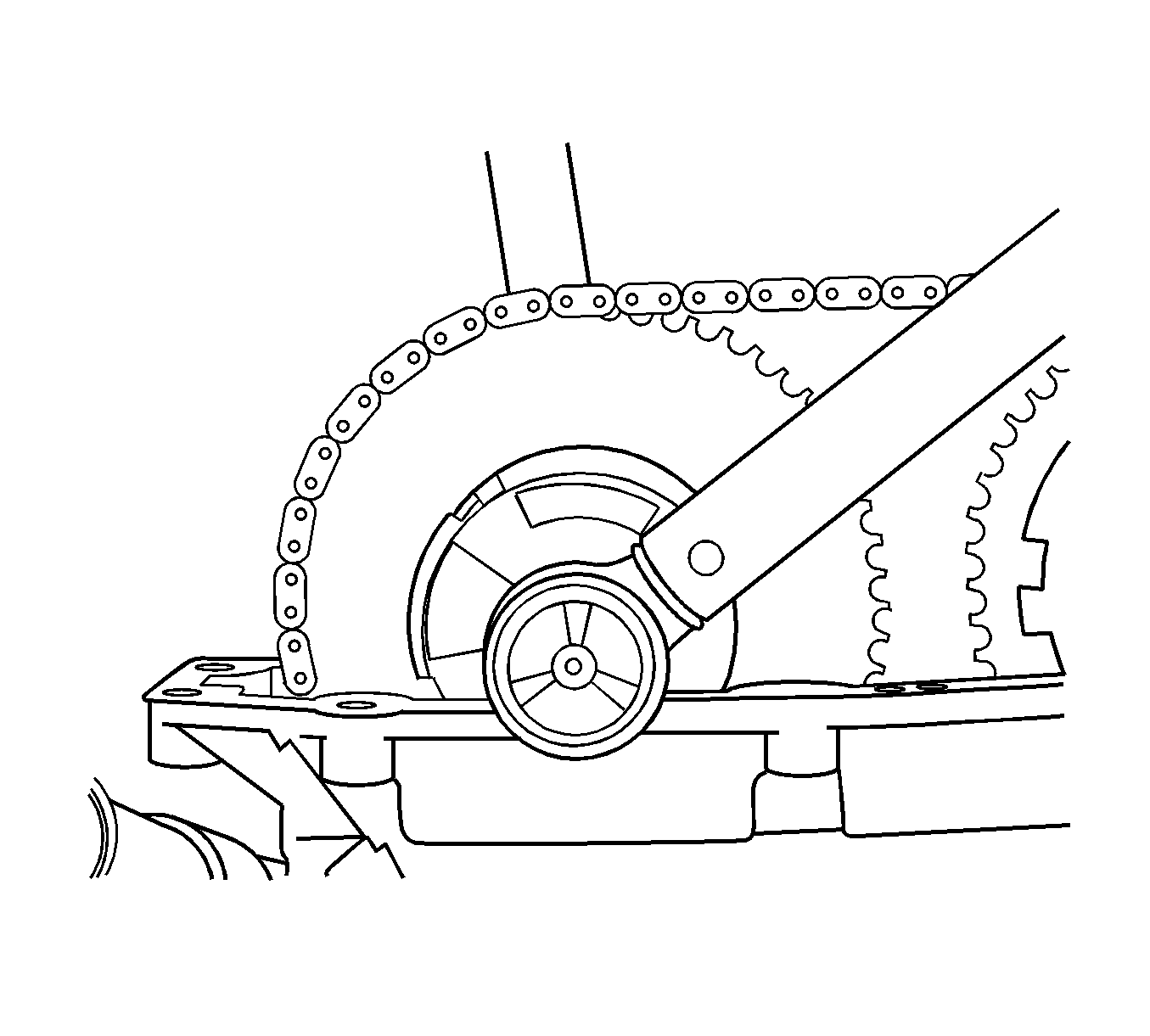
Tighten
Using
J 45059
, tighten the exhaust camshaft actuator sprocket bolt to 25 N·m (18 lb ft) plus 135 degrees.
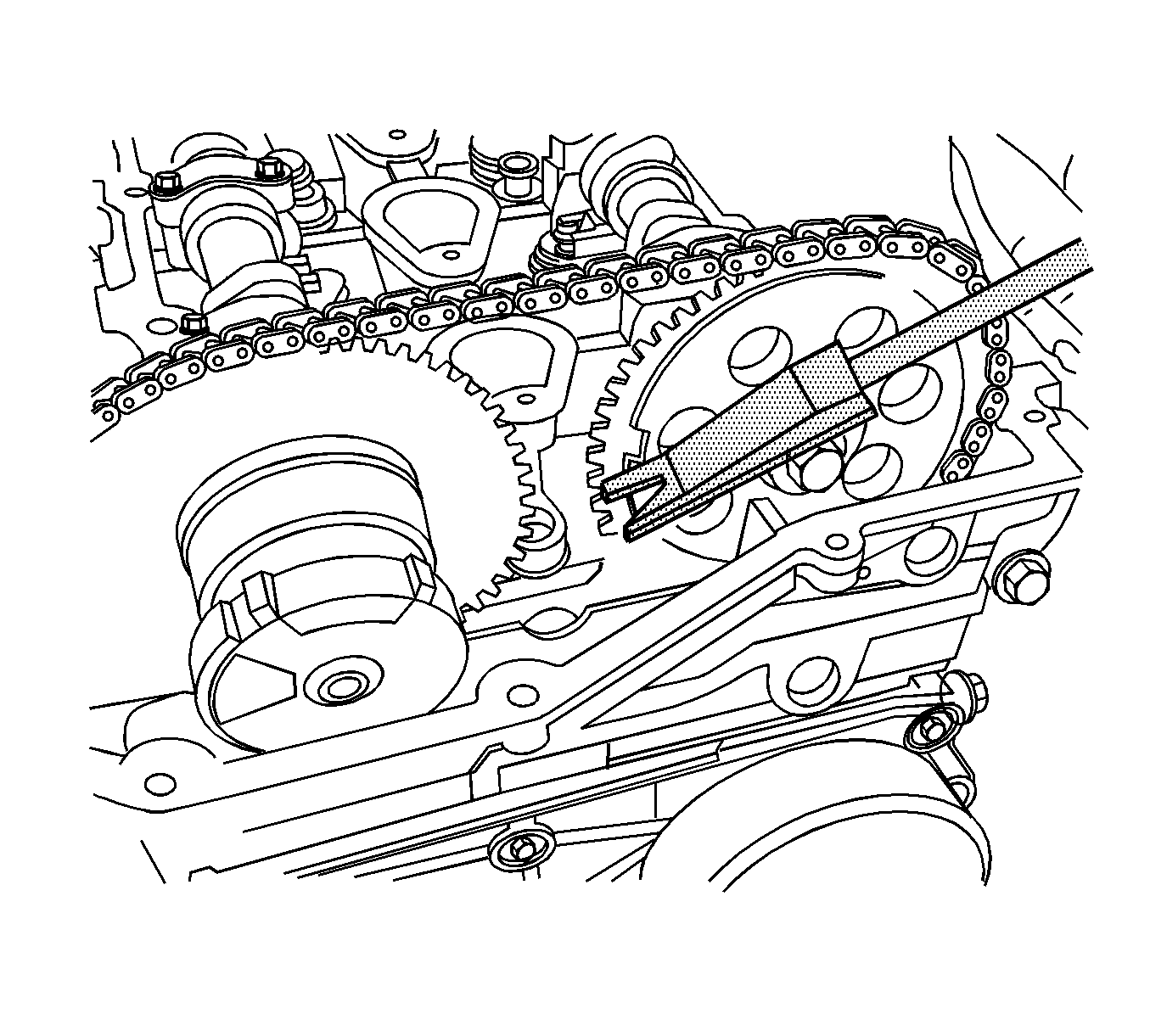
Notice: Ensure that the wedge tool is removed from engine prior to rotation. If the wedge tool is not removed, engine damage will result.
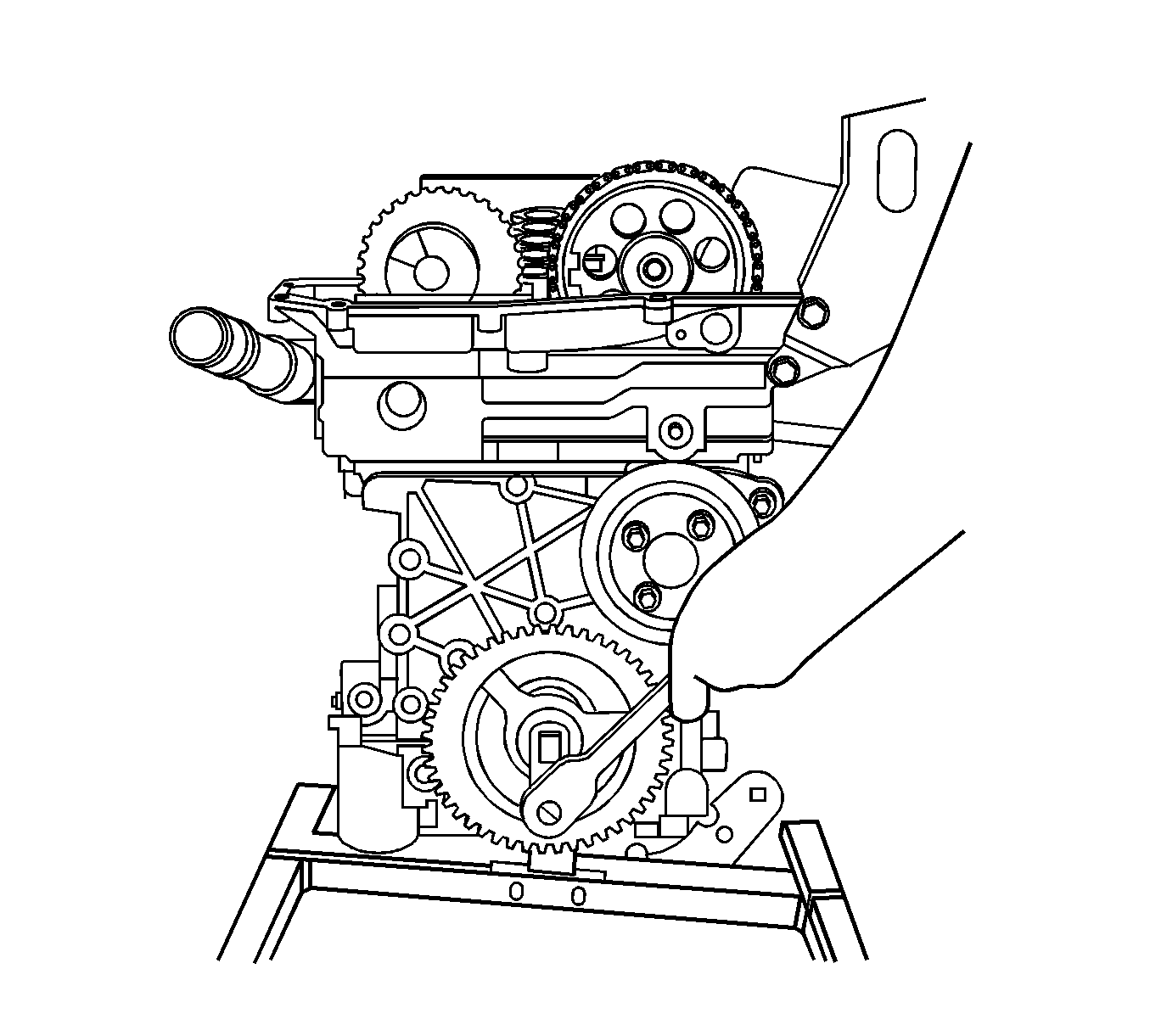
Important: It is critical that the engine is at TDC and not a couple of degrees off. If in doubt, repeat this step.

Important: DO NOT use the J 44221 , installed to the back of the camshafts, as a method to verify timing.
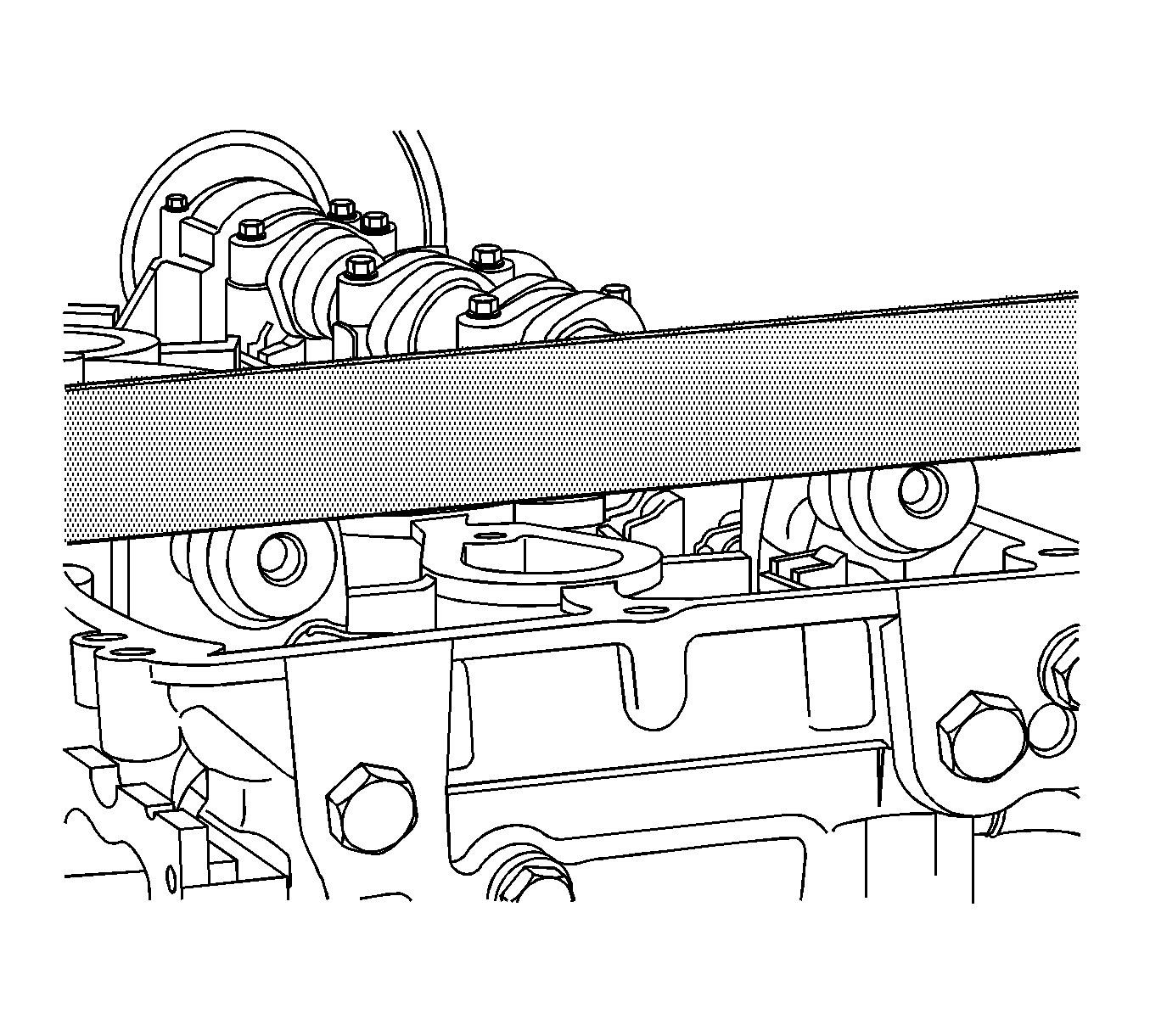
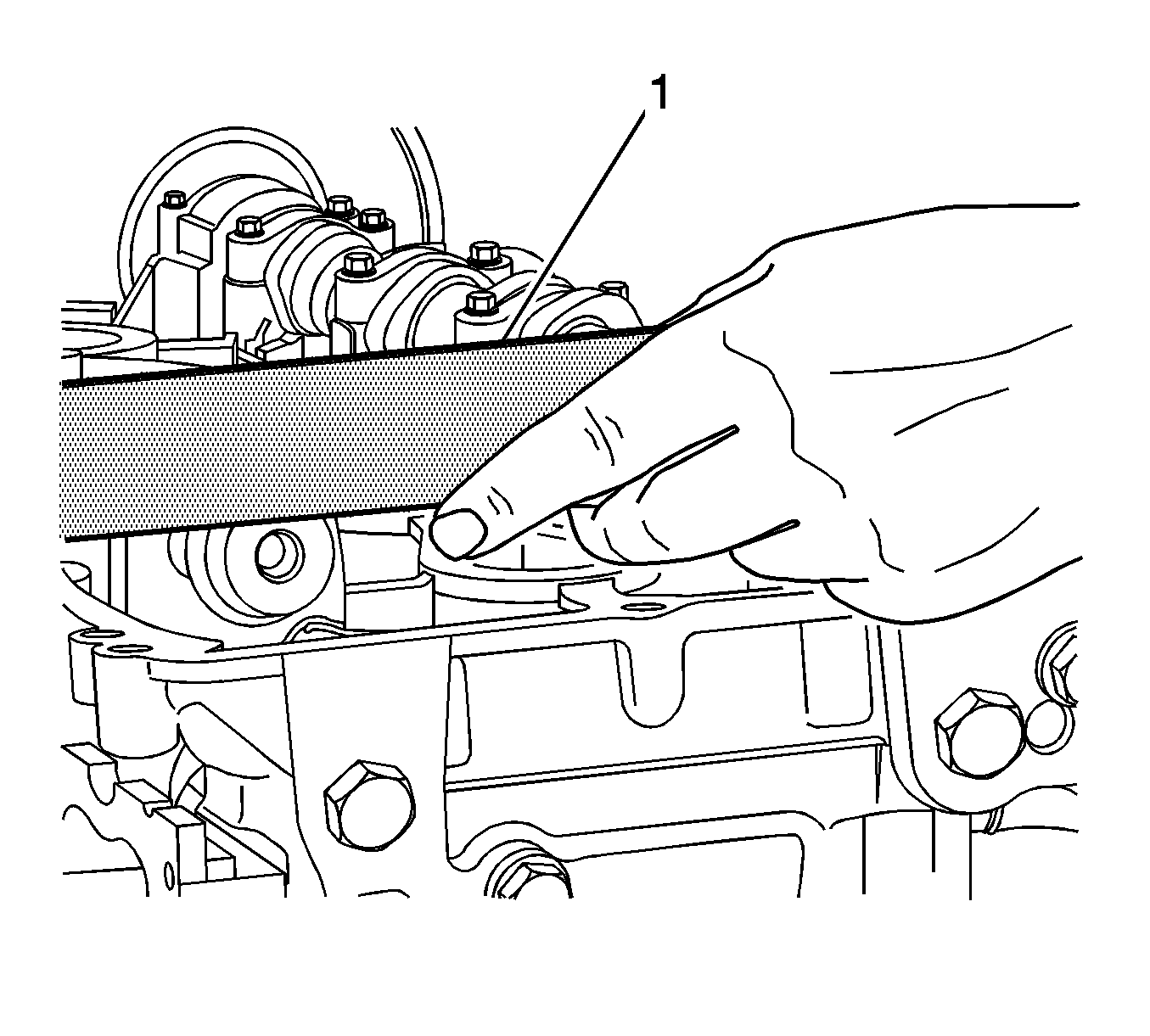
Tighten
Tighten the bolts to 10 N·m (89 lb in).
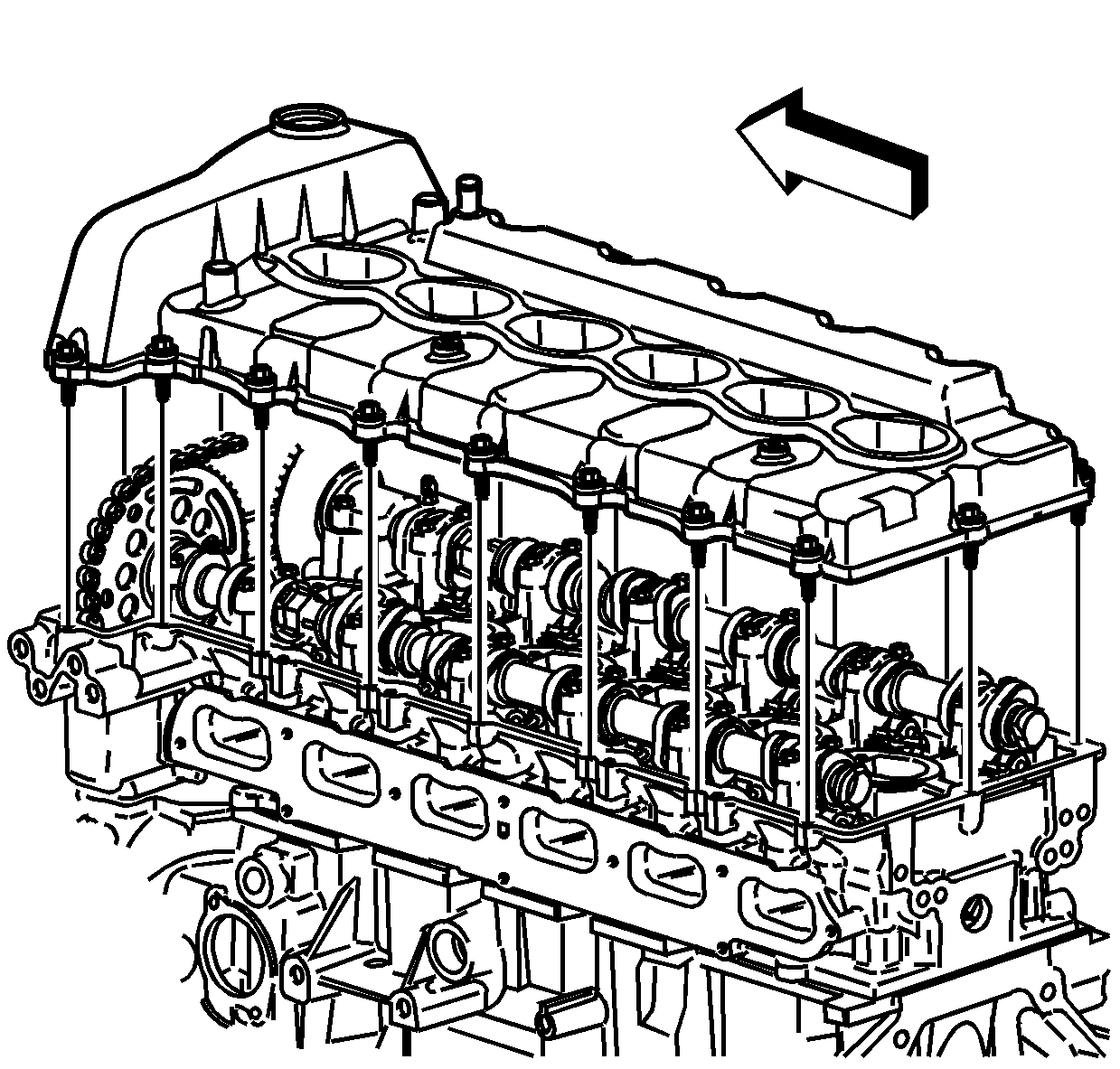
Tighten
Tighten the bolts to 10 N·m (89 lb in).
Tighten
Tighten the spark plug to 18 N·m (13 lb ft).
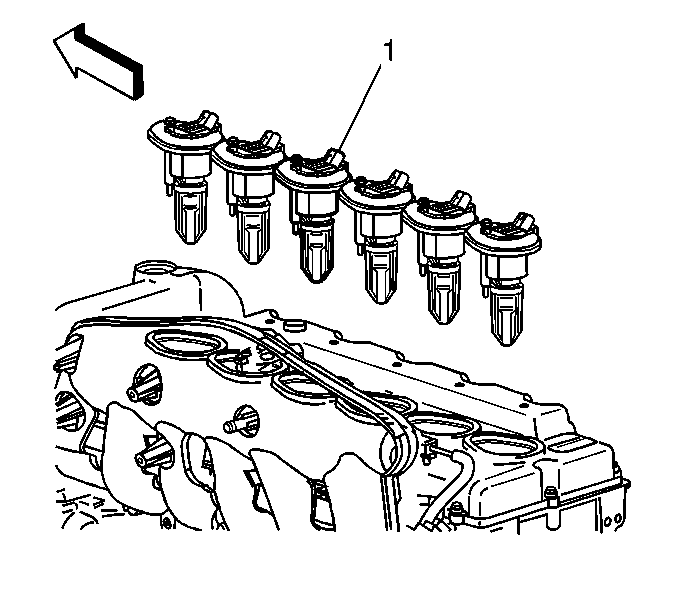
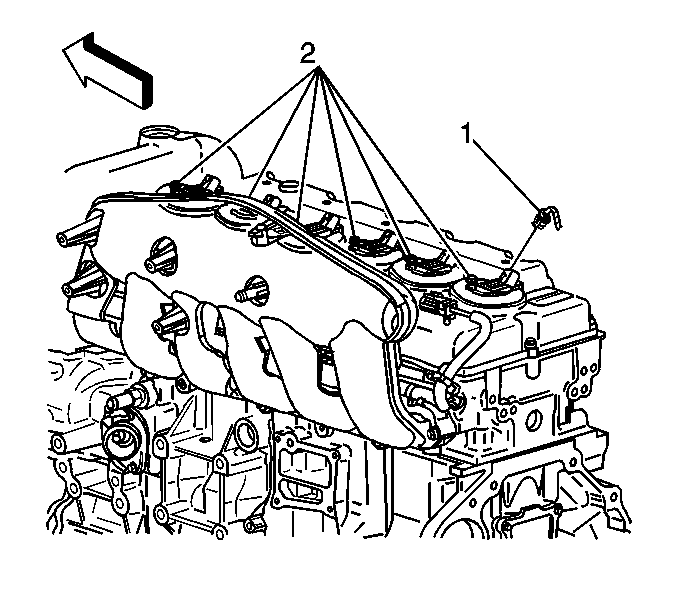
Tighten
Tighten the bolts to 10 N·m (89 lb in).
Tighten
Tighten the pipe studs to 25 N·m (18 lb ft).
Tighten
Tighten the nuts to 10 N·m (89 lb in).
Four-wheel drive--Raise the vehicle and install the blind intake manifold bolts from the left front wheelhouse access.
Two-wheel drive--The bolts are accessible from the top of the engine.
Tighten
Tighten the bracket bolts to 10 N·m (89 lb in).
| • | PCM |
| • | Map sensor |
| • | Ignition coils |
| • | Harness clamps at power steering pump |
| • | Wiring harness fastener at right front inner fender |
| • | Throttle body |
| • | Camshaft sensors |
| • | Exhaust camshaft actuator |
| • | Fuel injectors |
| • | HO2S |
| • | AIR valve and connectors |
| • | Thermostat--Refer to Engine Coolant Thermostat Replacement . |
| • | Generator--Refer to Generator Replacement . |
| • | Drive belt--Refer to Drive Belt Replacement . |
| • | Check for DTCs. |
| • | Road test the vehicle. DTC P0016 is a Type B diagnostic code. Three consecutive ignition key cycles must be performed during the road test with a minimum of a one minute run time between key cycles to verify that a DTC P0016 did not set. For further information on DTC P0016, refer to DTC P0016 . |
